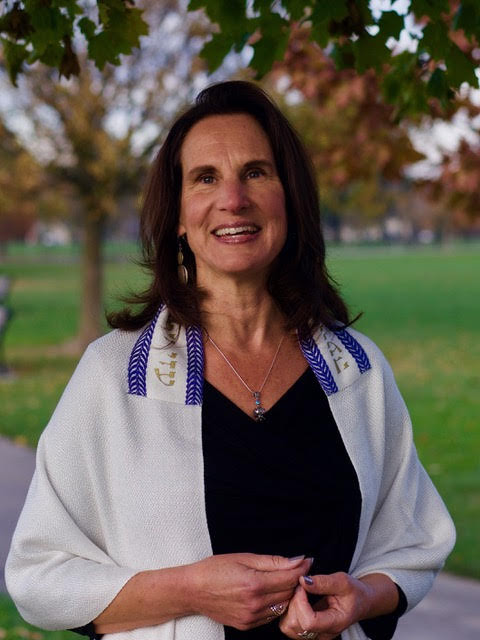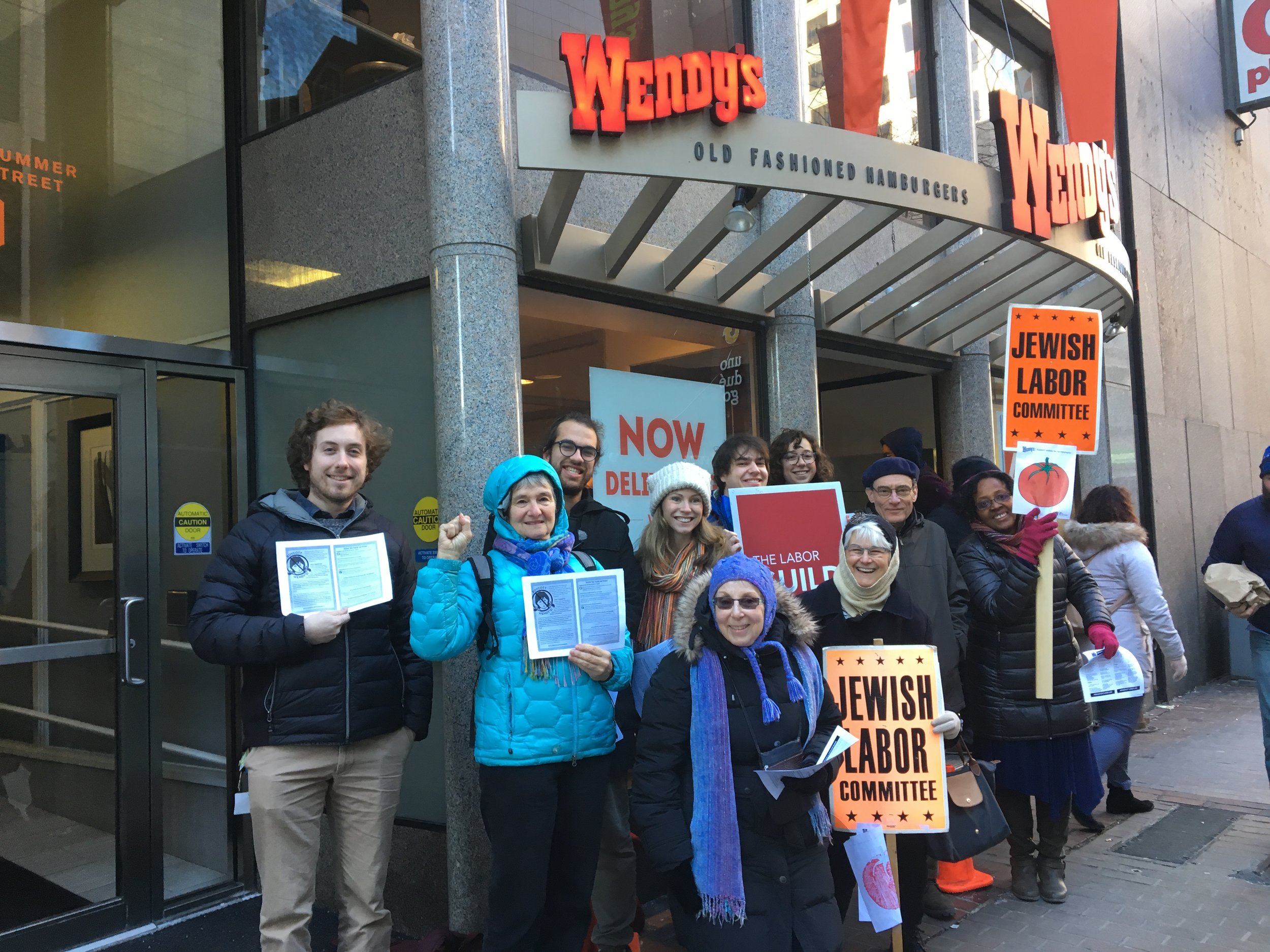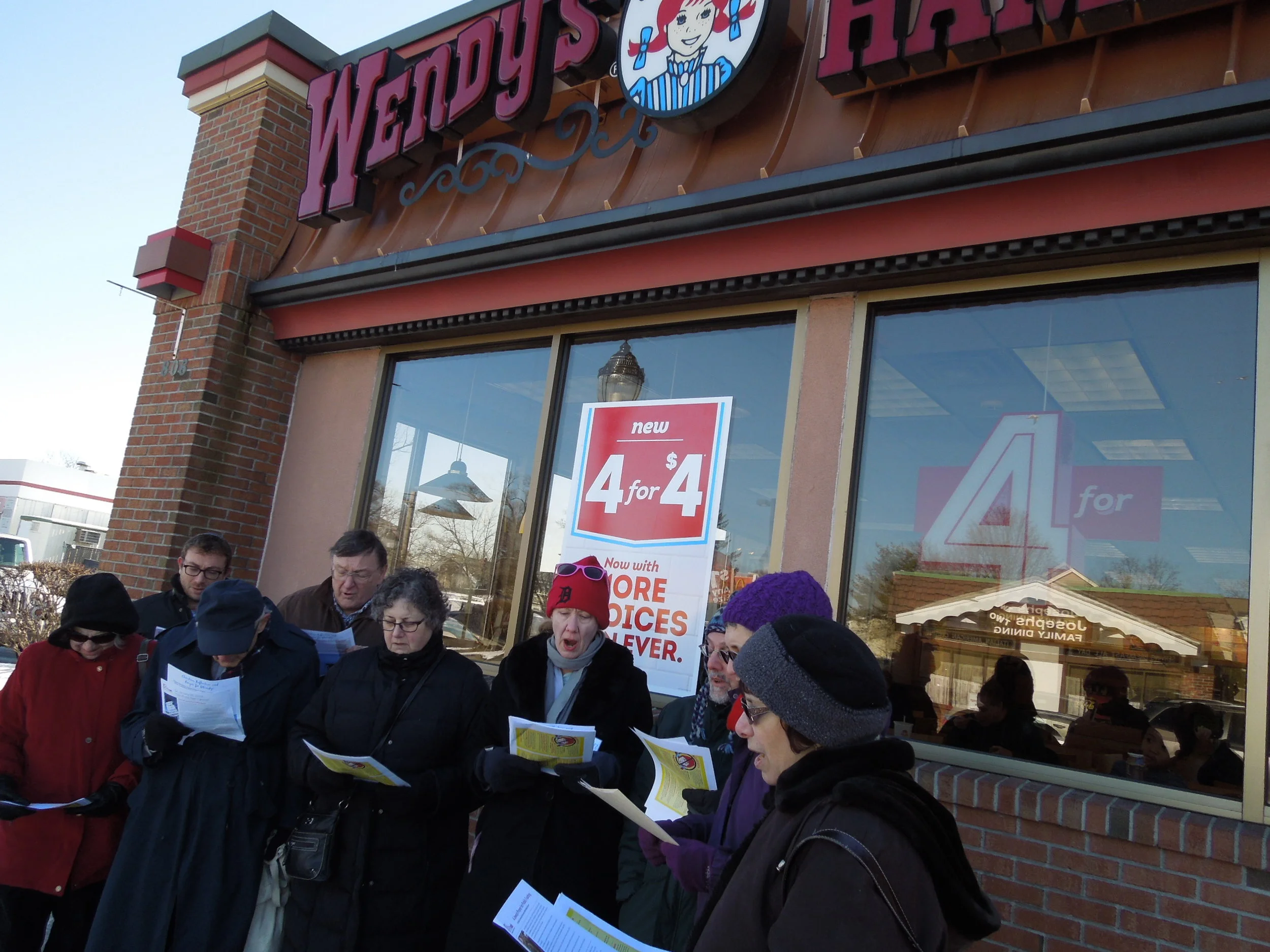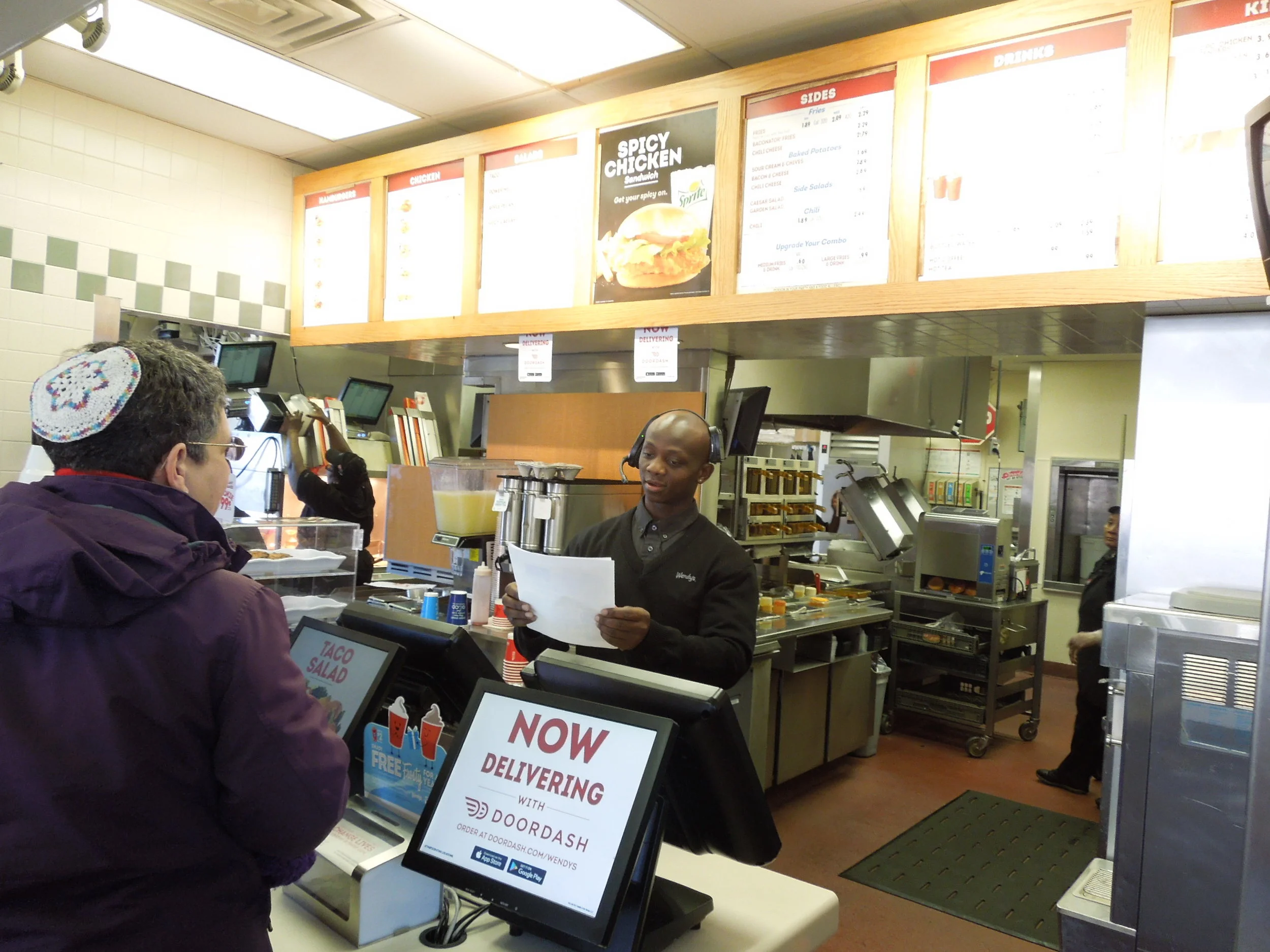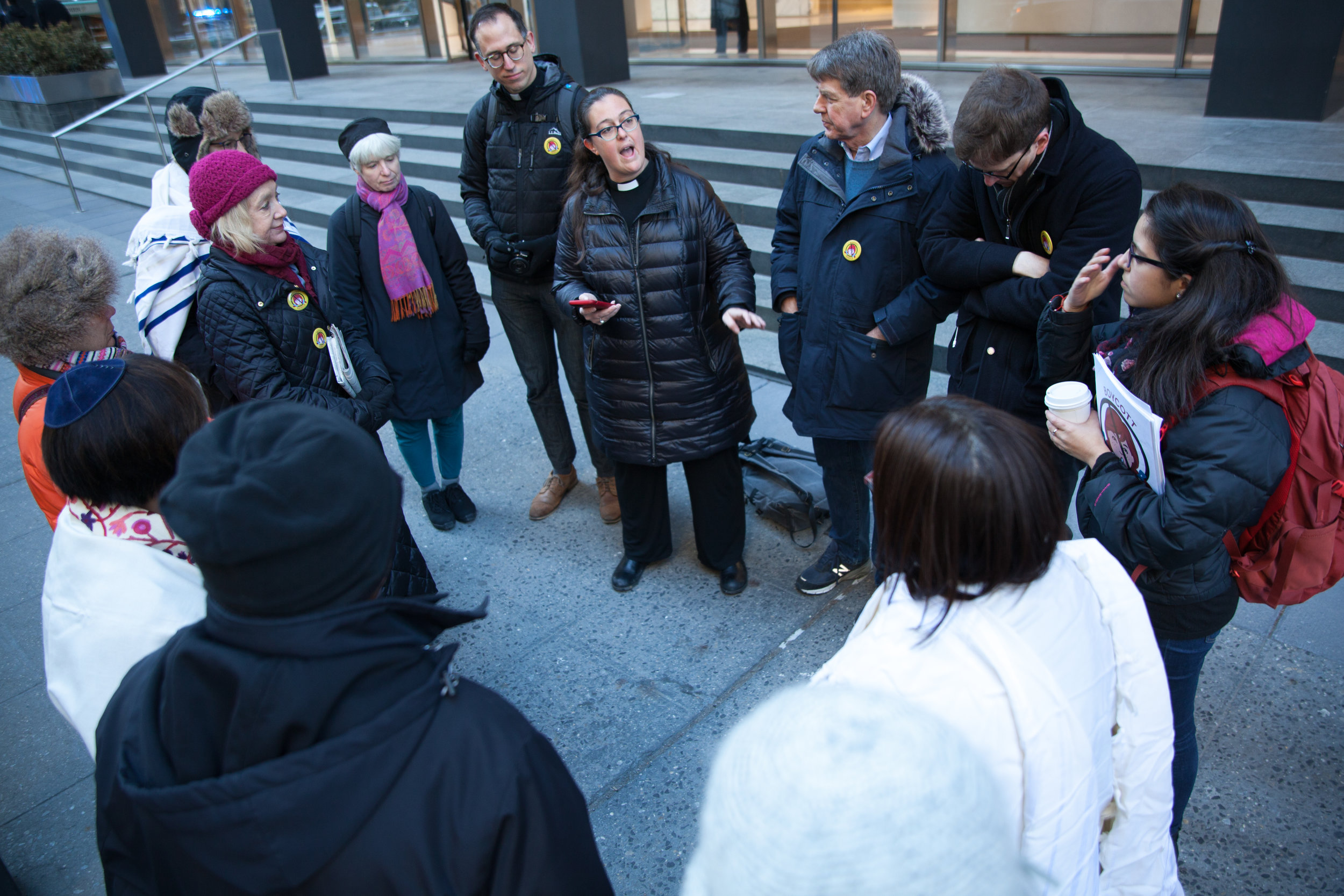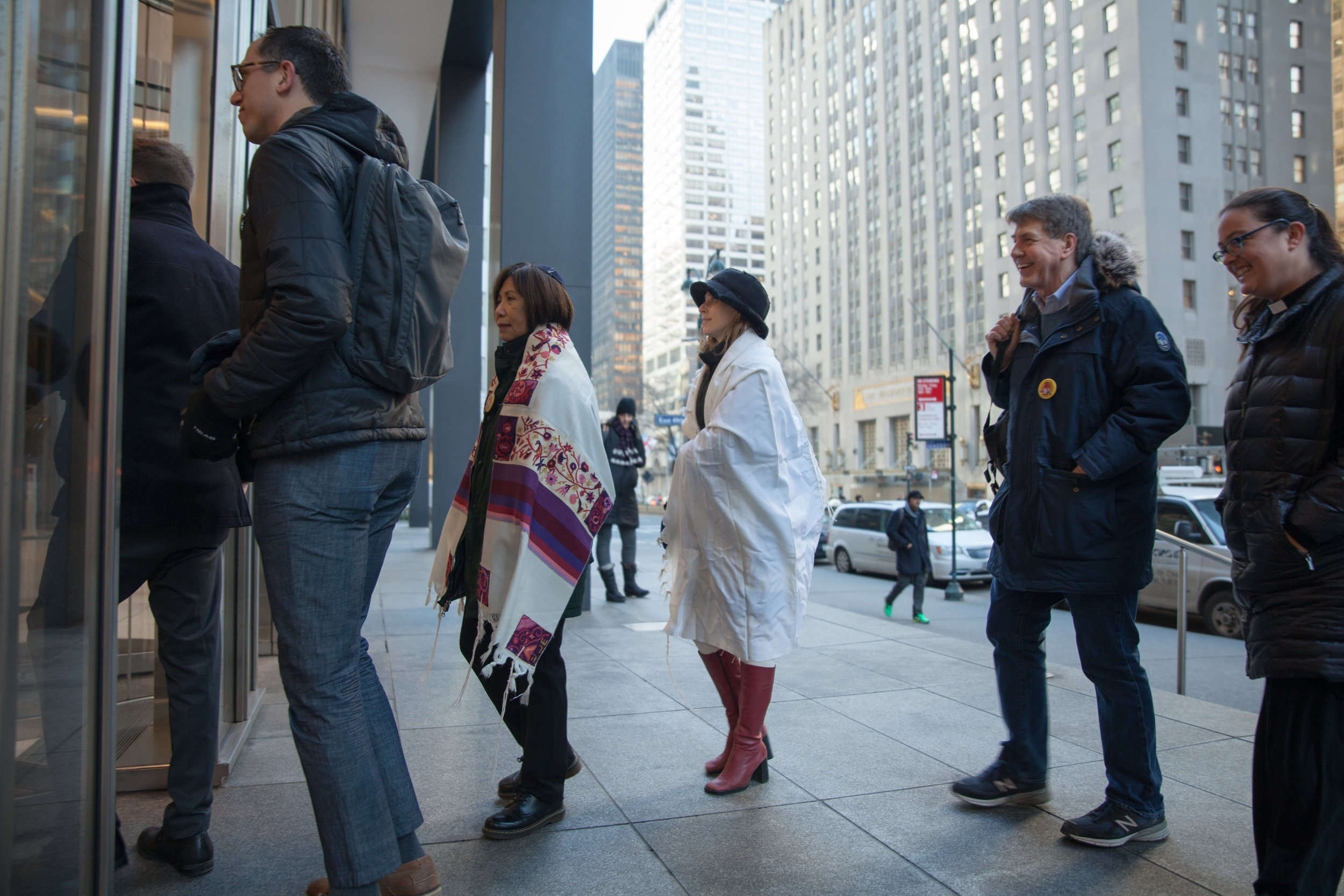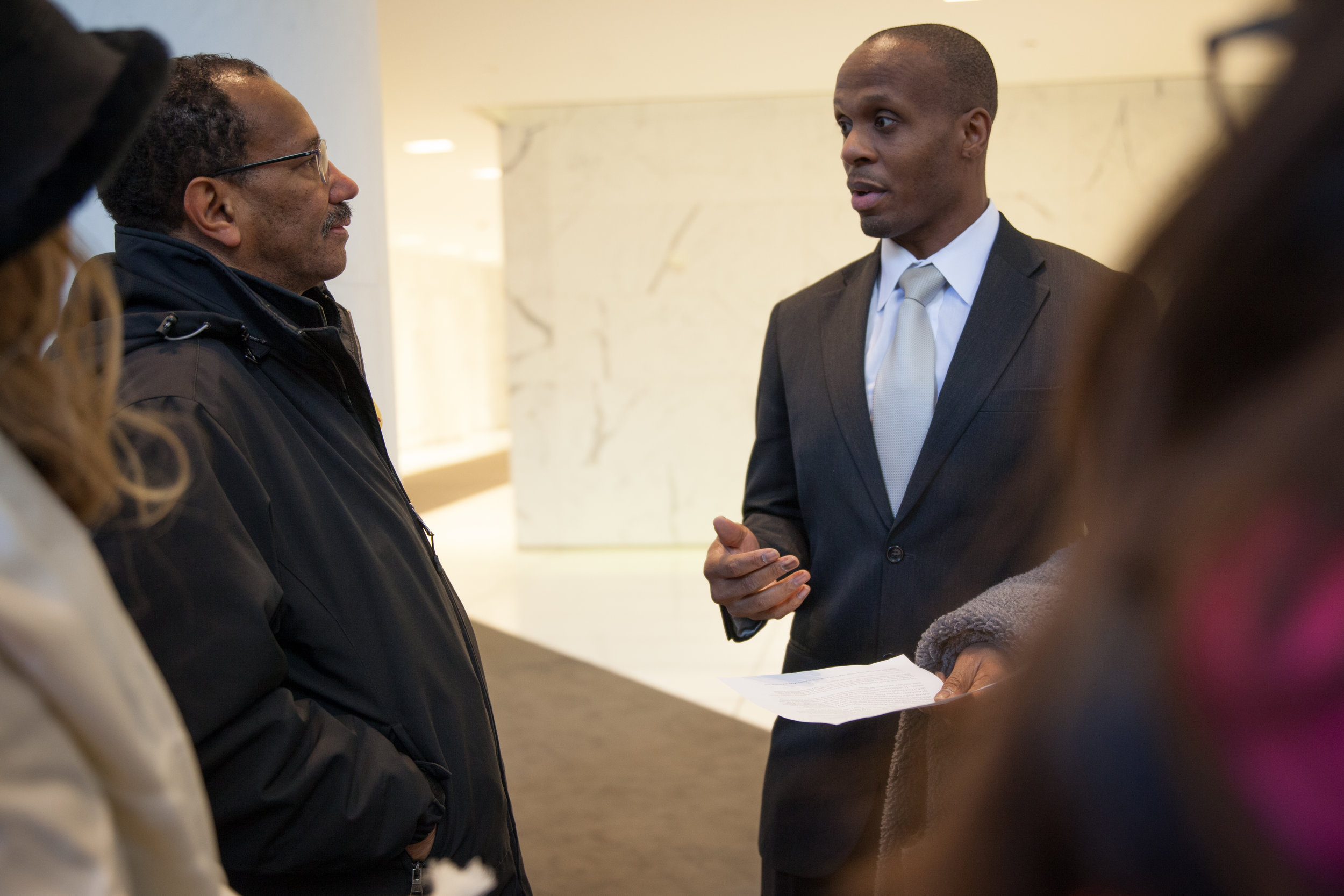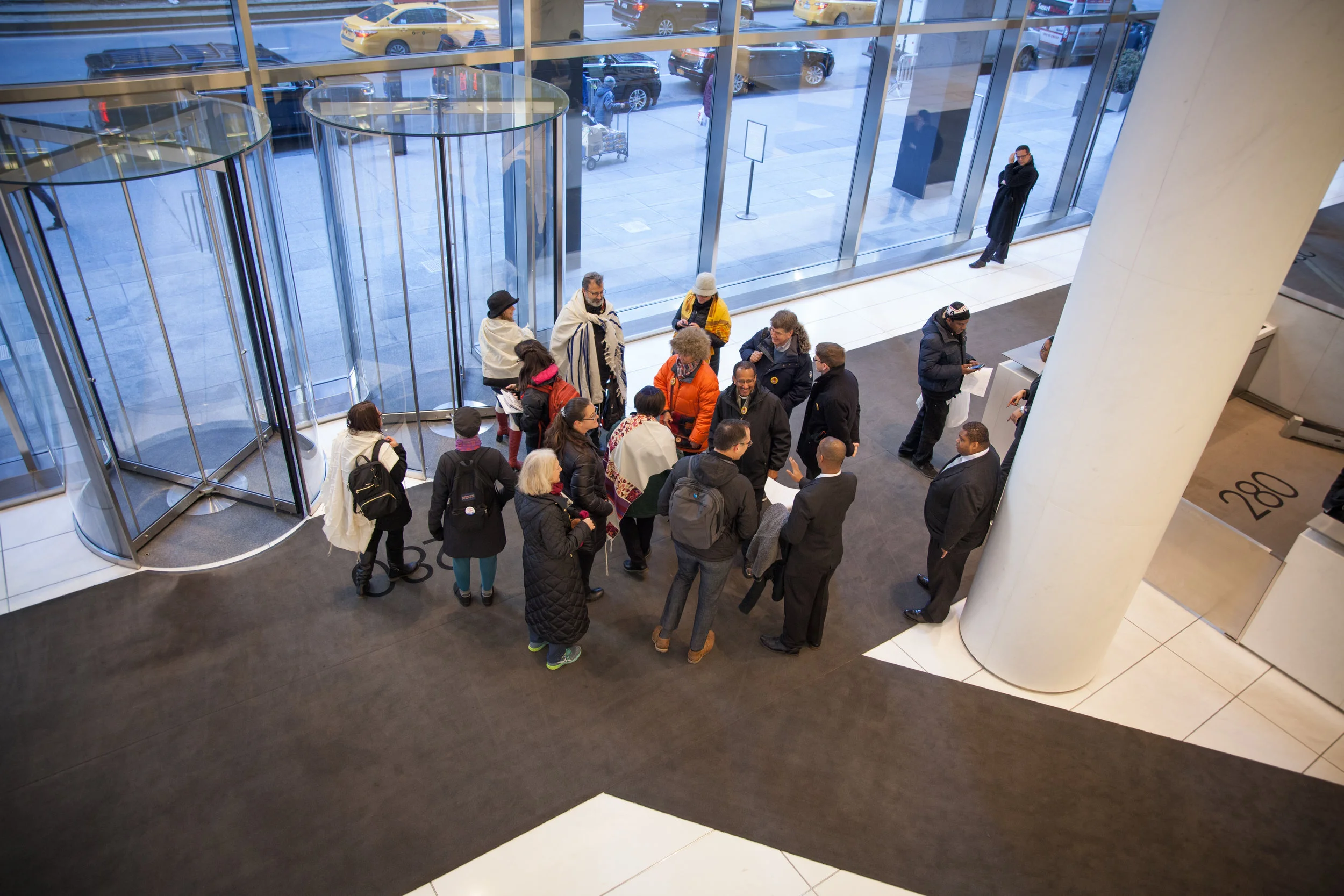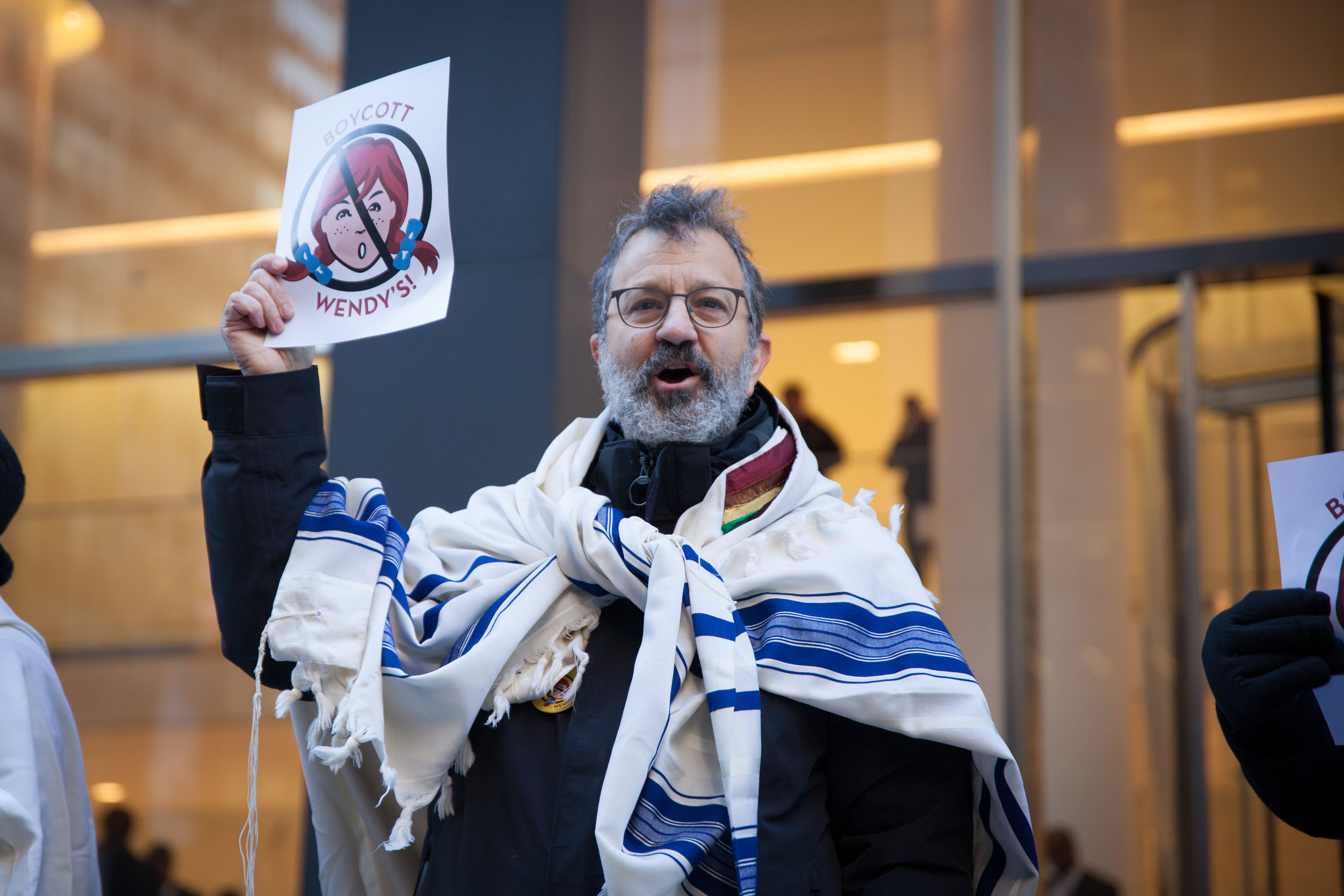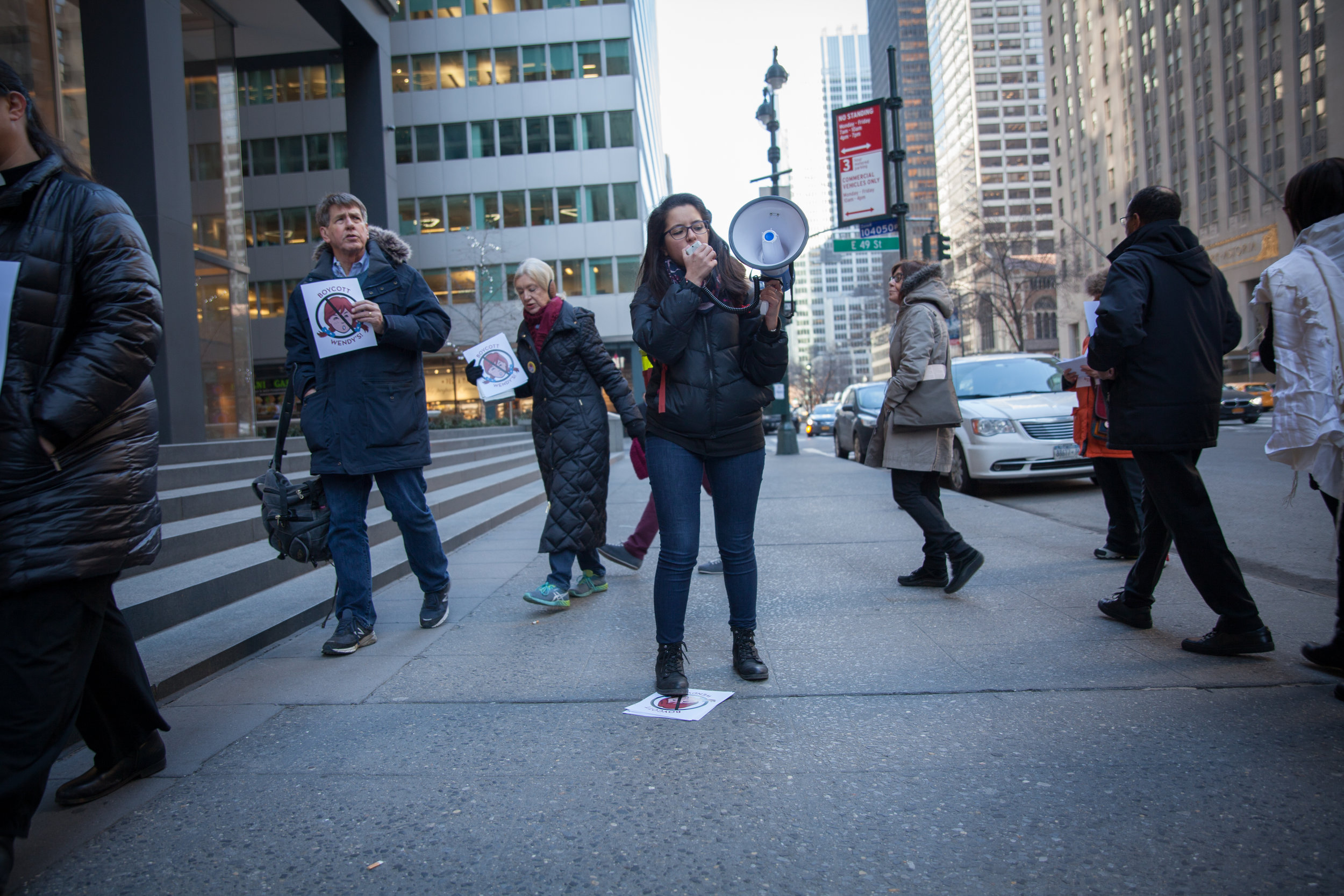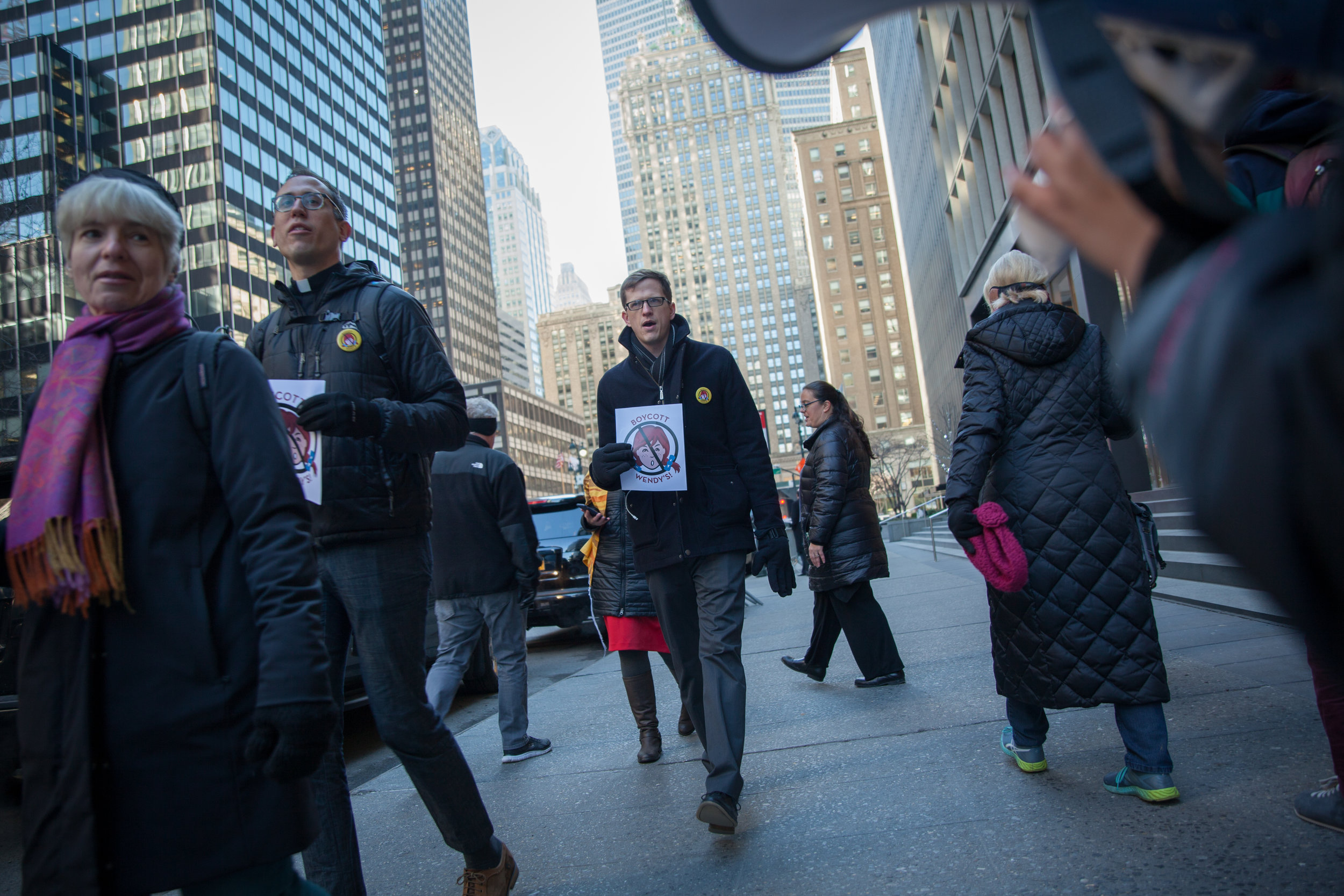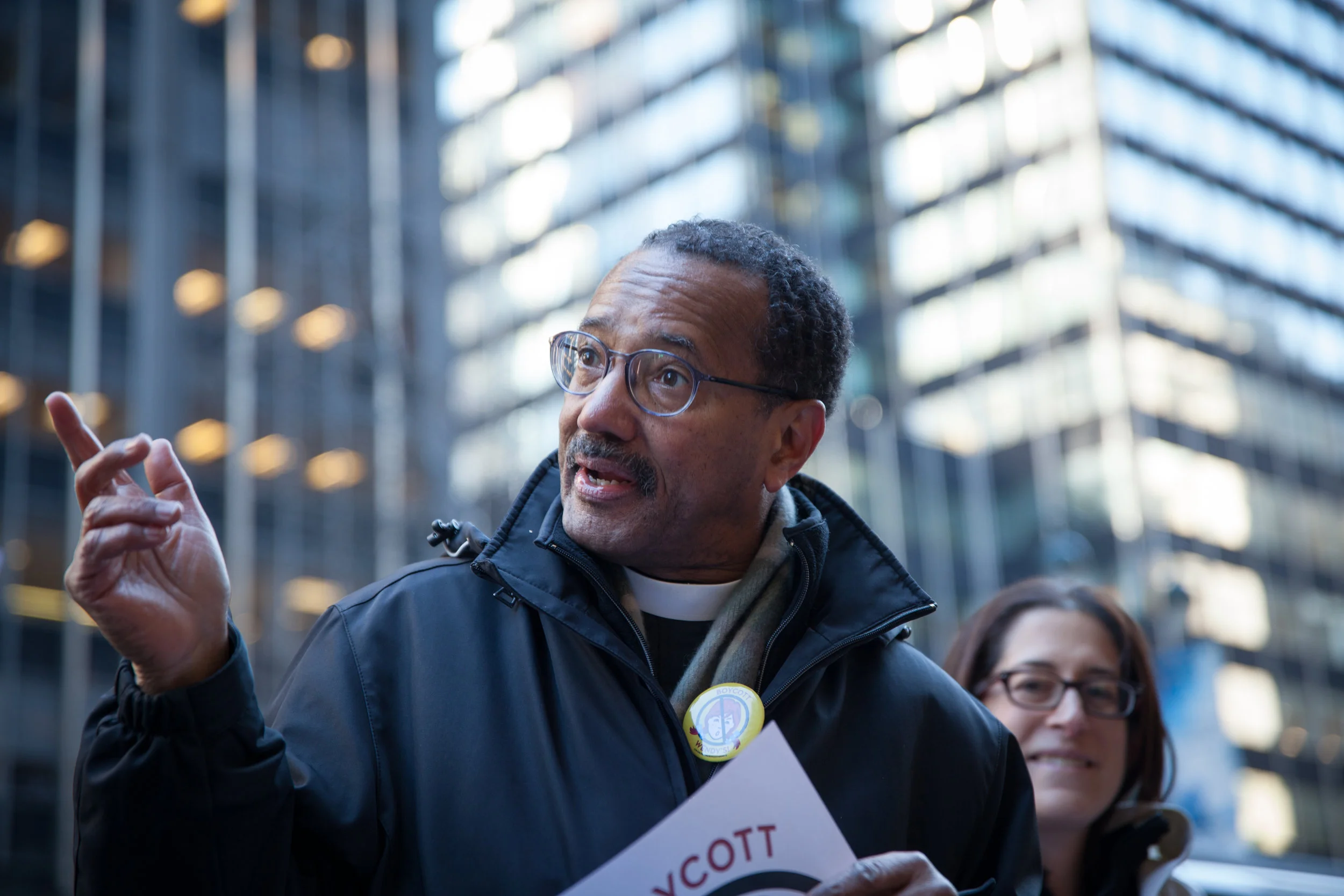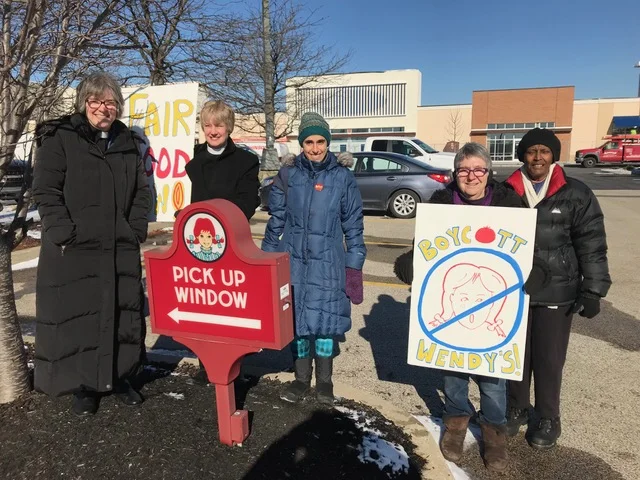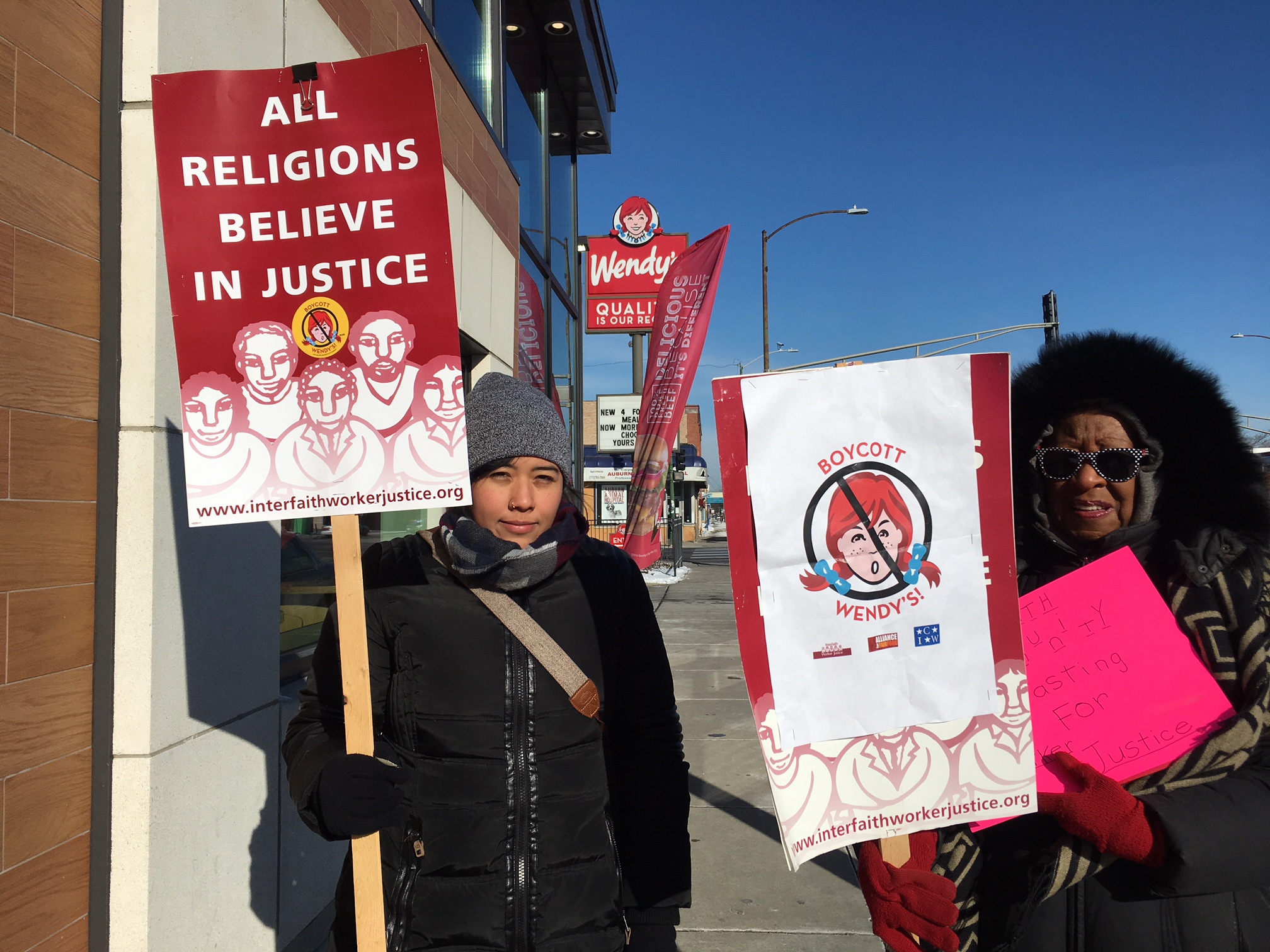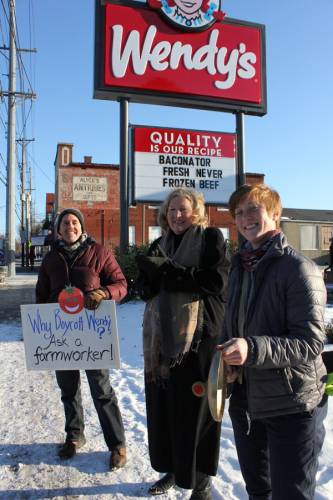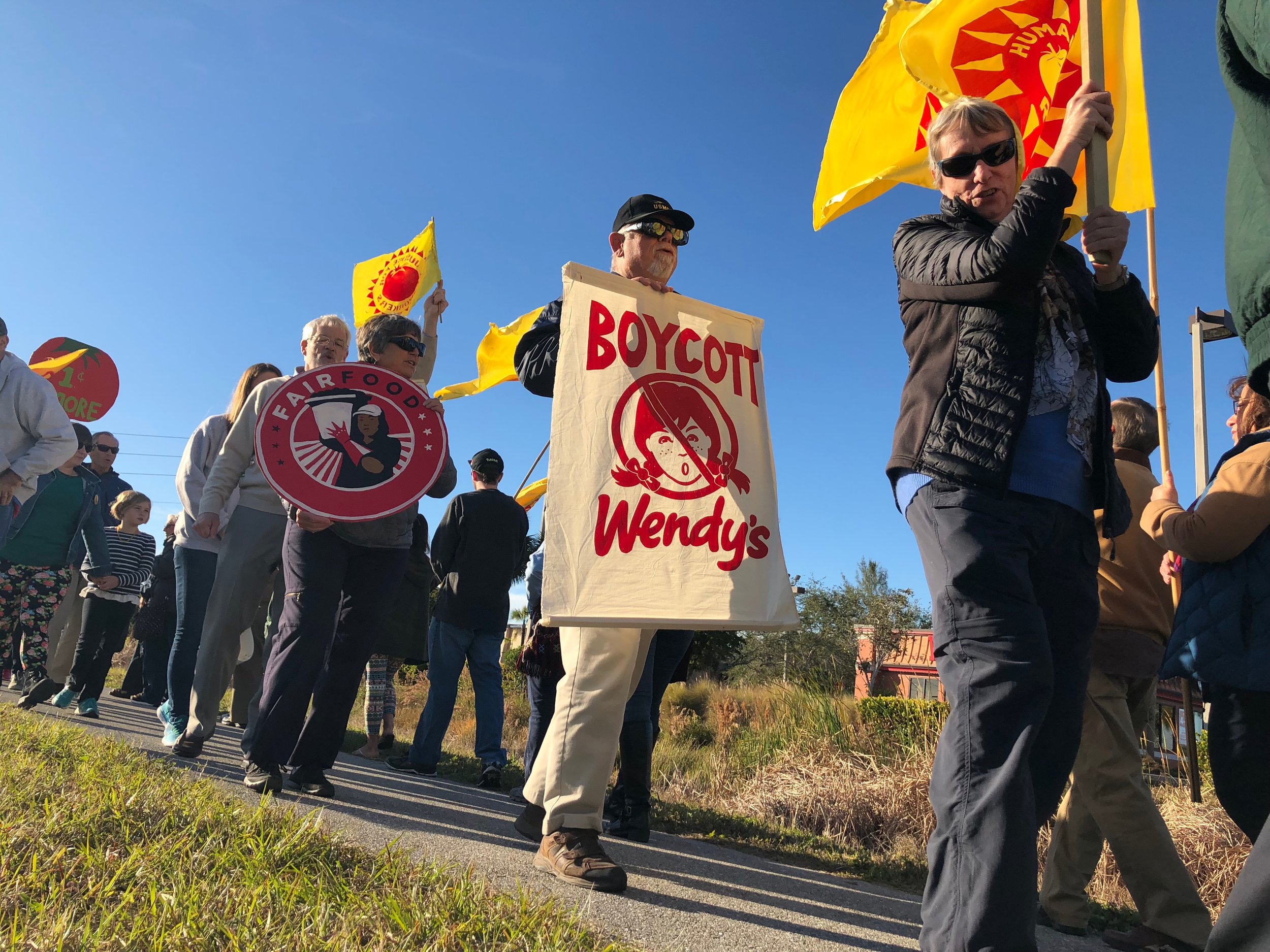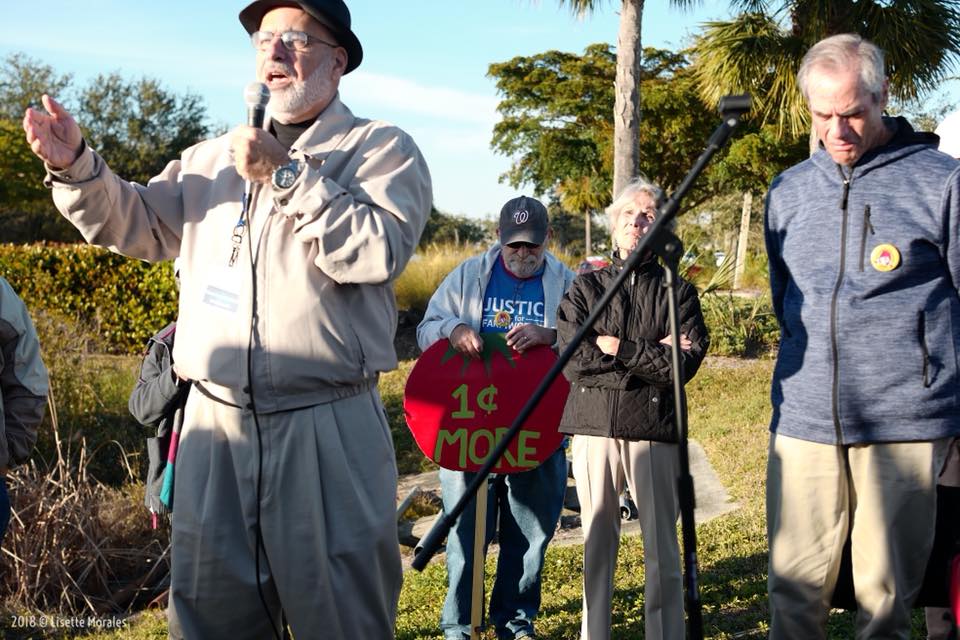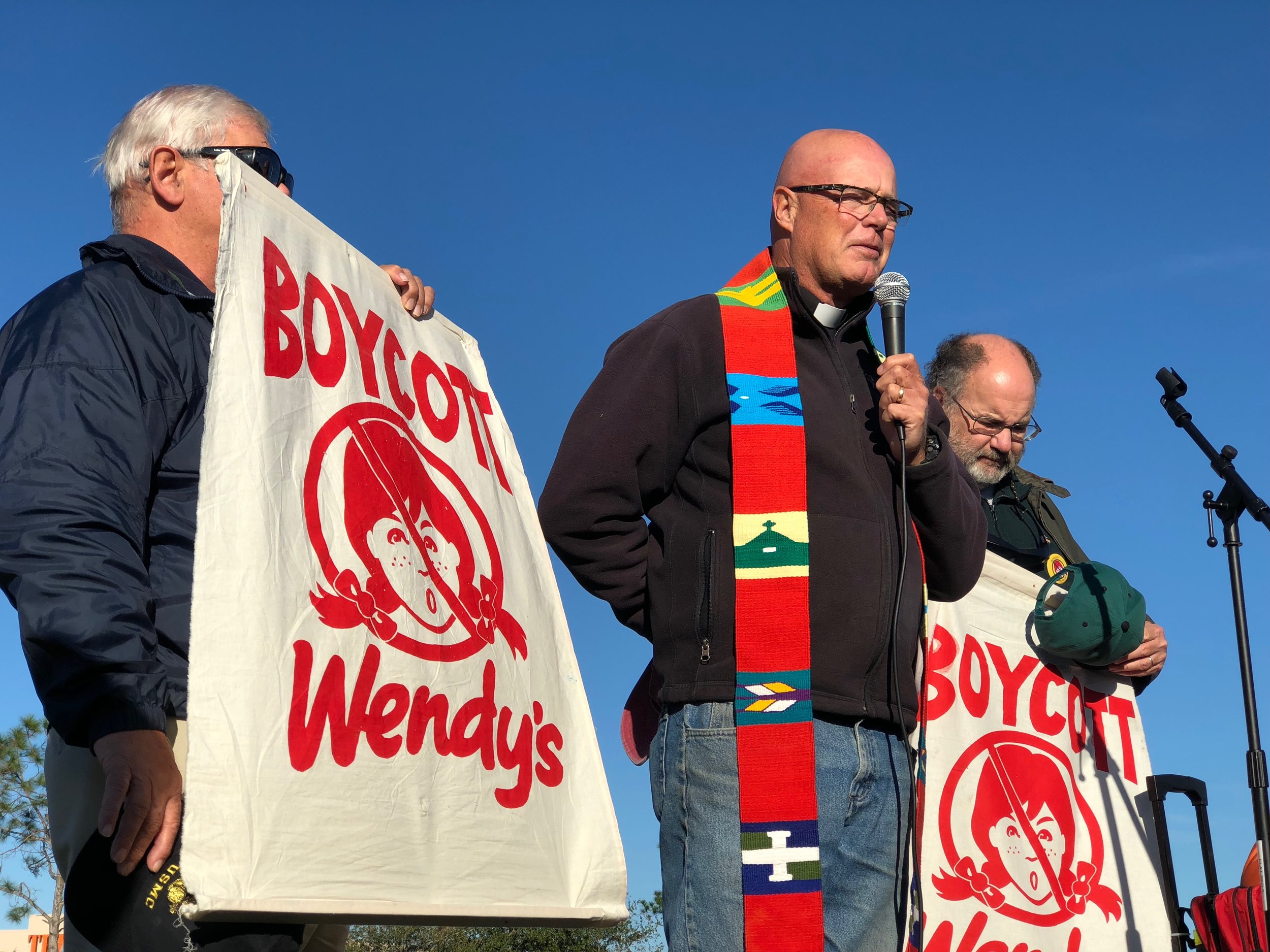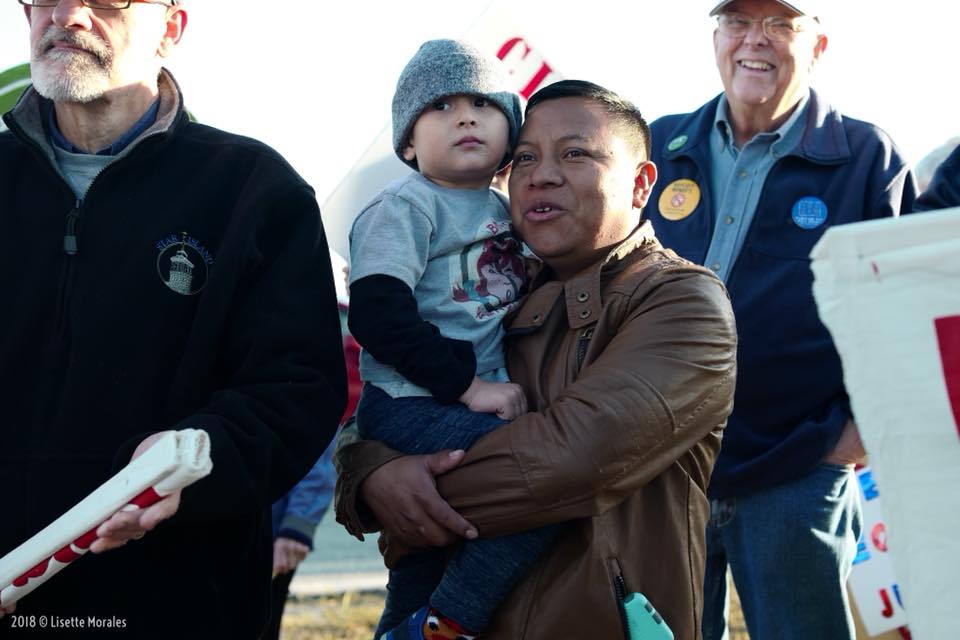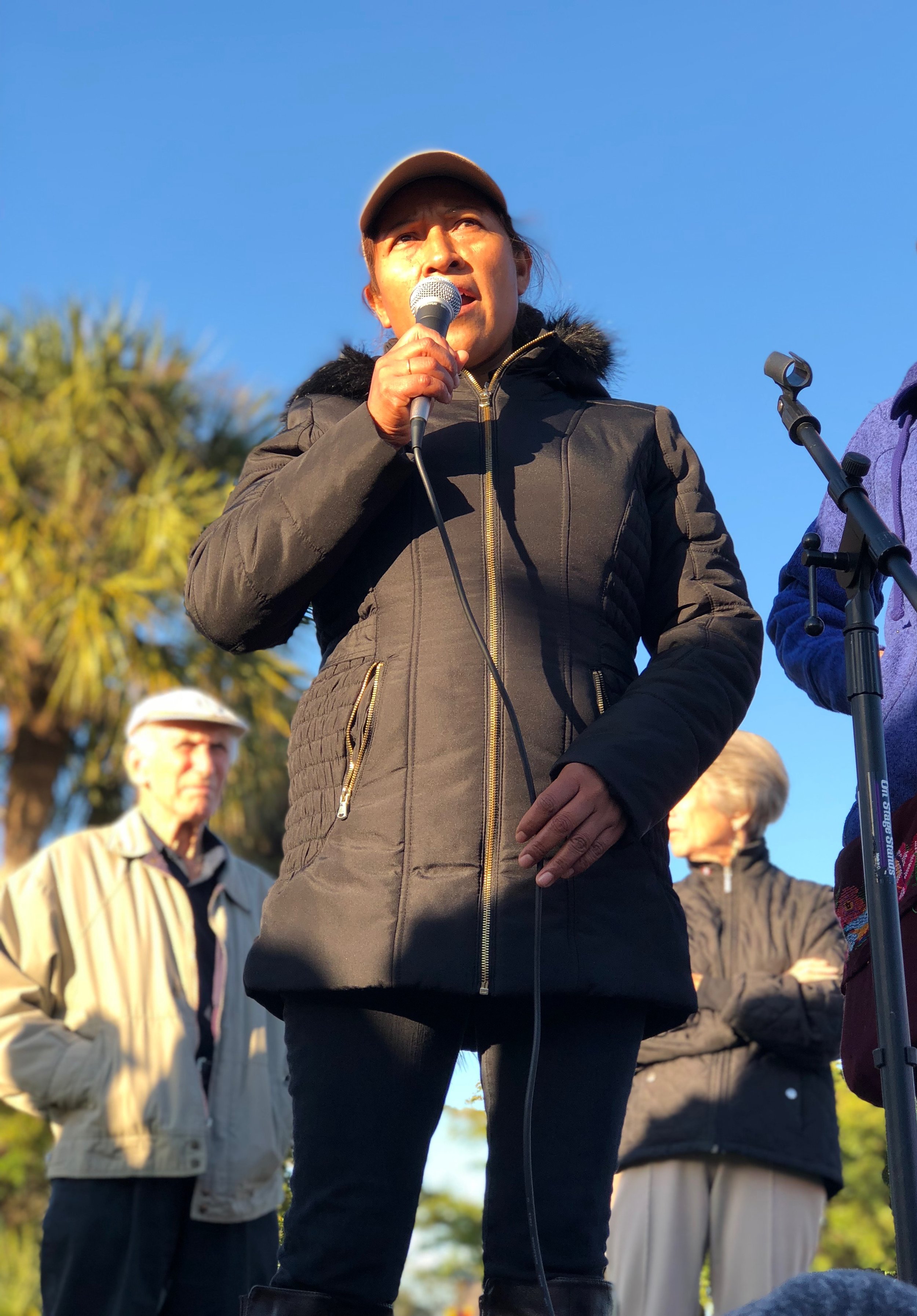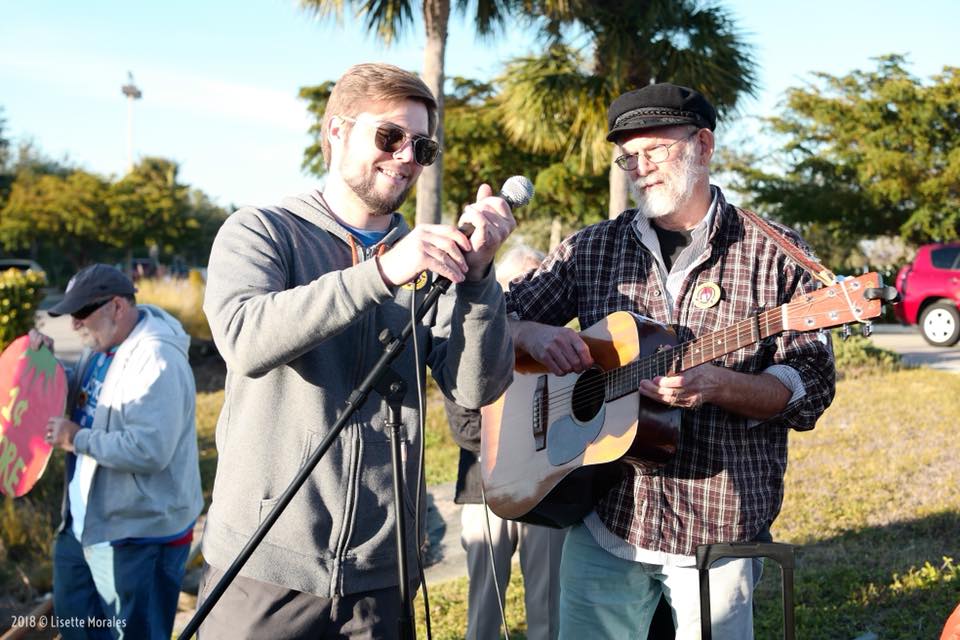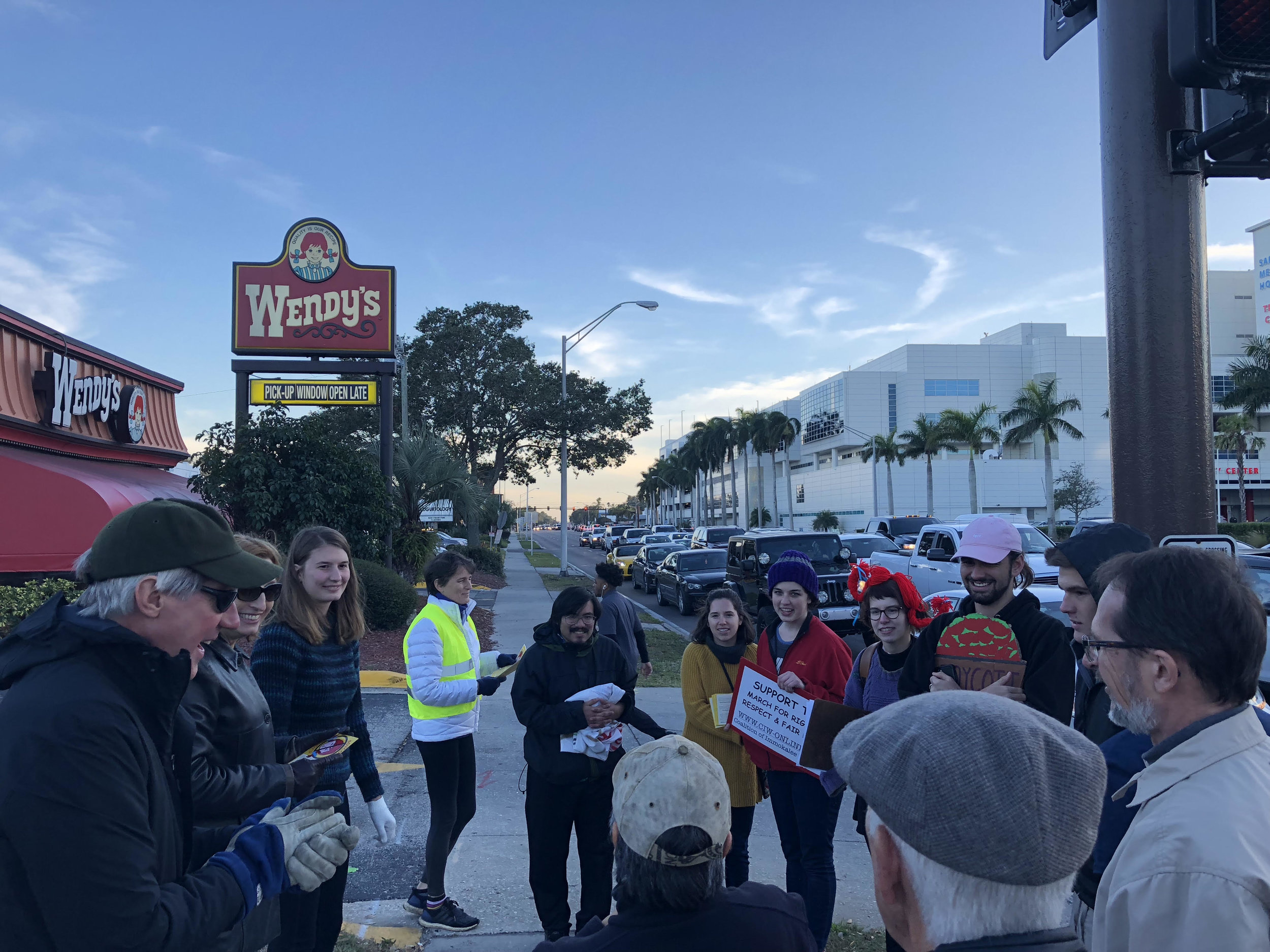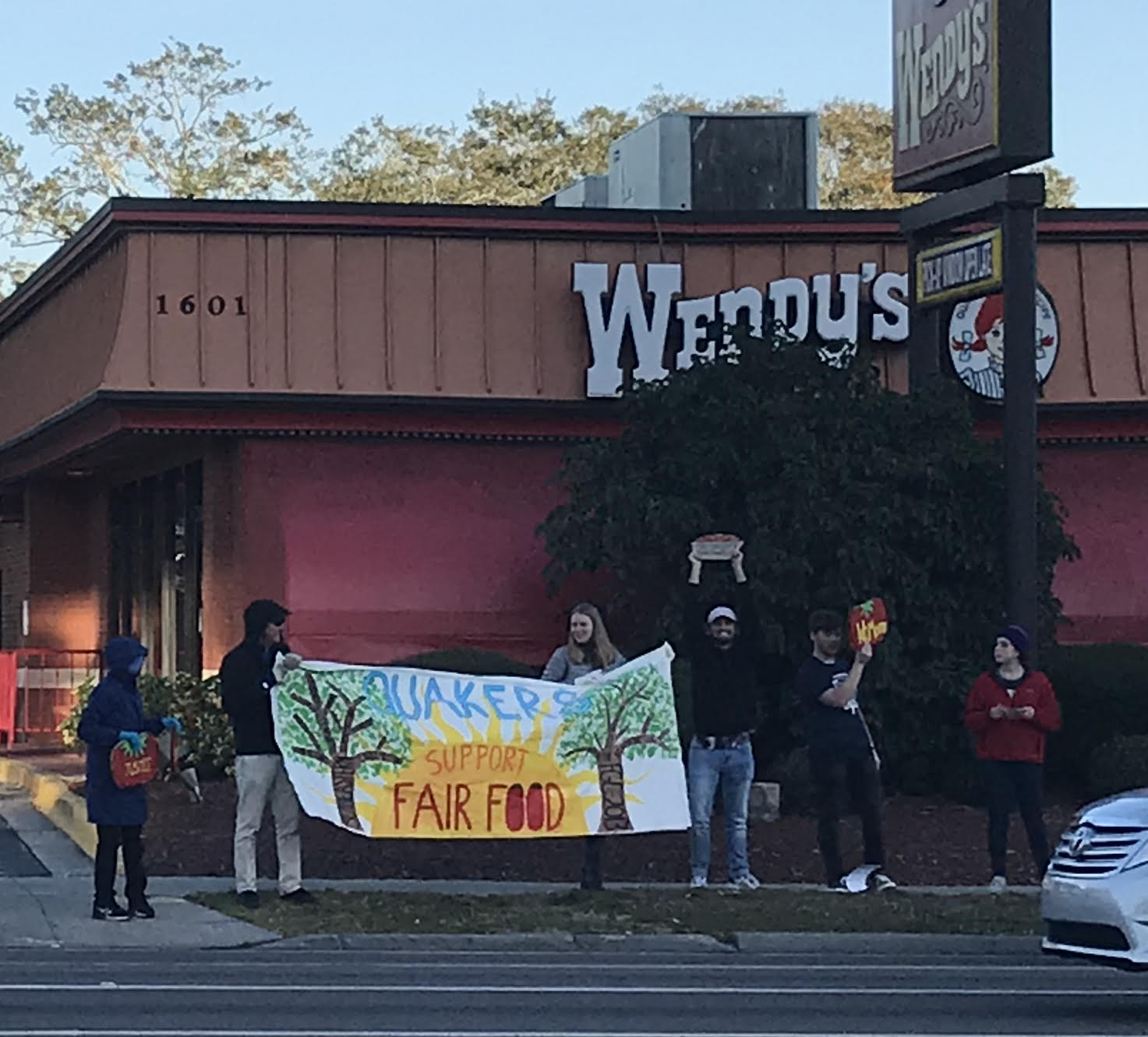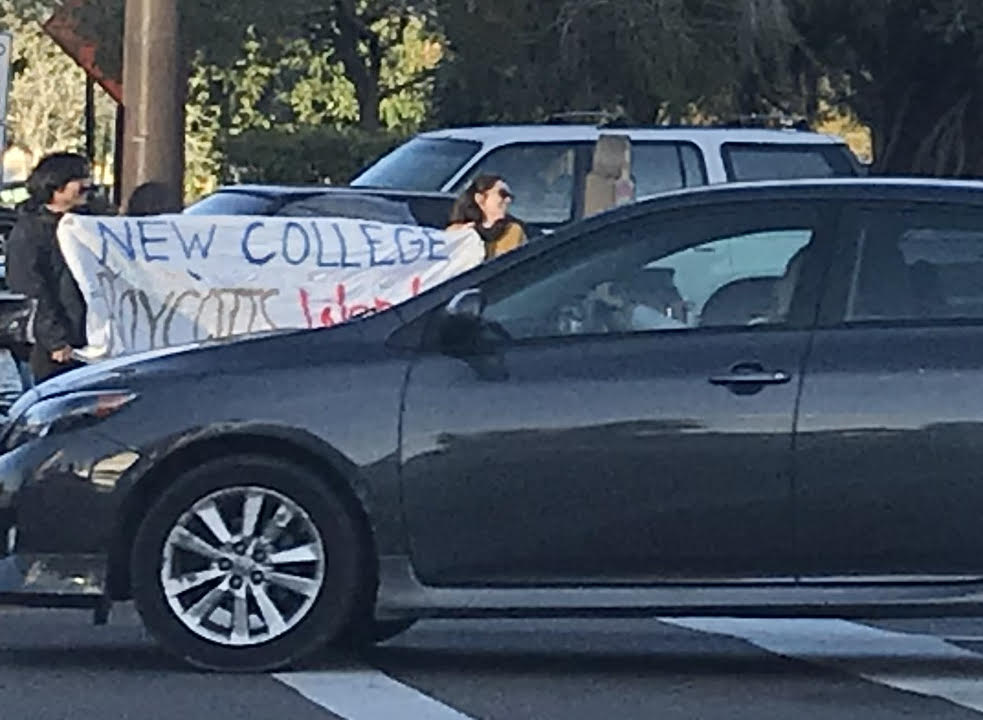Spiritual resources: Lenten reflection #4 on fasting with farmworkers by Immokalee's Pastor Miguel
Throughout the season of Lent, pastors and other Christian leaders who are in solidarity with the Coalition of Immokalee Workers will offer short Lenten reflections that intersect this holy time of discipline and self-determination with the ongoing struggle for Fair Food. These reflections will be released to our Interfaith Network every week between February 14 and March 28.
Today, we have a Lenten reflection by Rev. Miguel Estrada, the pastor at Peace River Presbytery's Mision Peniel in Immokalee. Pastor Miguel writes about his experience fasting alongside the CIW during last week's five-day Freedom Fast in New York City.
Sigue la versión en español.
Lenten Reflection #4:
Fasting with CIW
Fourth week of Lent, John 3.14-21
Like Nicodemus, looking for Jesus at night, I approached the experience of fasting for five days with the Coalition of Immokalee Workers in front of the offices of Nelson Peltz in Manhattan with more doubts than answers. I fasted with the intention of continuing the call to Wendy's to sign the Fair Food Program, which among other things promotes the cessation of sexual abuse experienced by women in the agricultural fields.
Now, I can say that my secret visit to the Redeemer, like the visit of Nicodemus, has opened my eyes to the light; to the desire to move next to those who do not fear to be where justice shines in all its splendor. I wish to be with those who do not fear being in the light, with those who do not hide "because they know that their works have been done in God" (John 3.21).
My awakening to light, I describe it as follows:
Pastor Miguel from Peace River Presbytery's Mision Peniel (center) leading a blessing during last week's Freedom Fast in NYC
I thought I knew ...
what it is to work hard, until I saw the people who do it in the fields.
what it is to be abused, until I witnessed the exploitation that befalls agricultural workers.
what it is to be poor, until I measured how little farmworkers receive for their hard work.
what it is to sacrifice for others, until I saw the commitment of a farmworker to his family and community.
what it is to suffer, until I knew the physical and emotional pain of agricultural workers.
what it is to endure hunger, until I sat down at the table with people returning from work in the fields.
what is to feel pain, until I heard the stories of resilience of the peasants.
So, I also thought I knew ...
what is fair, until I realized that through my lifestyle I am complicit by action and omission in a system that enslaves, abuses, exploits and sacrifices many for the well-being of a few.
what it is to be happy, until I saw the smiling face of an agricultural worker after a long day's work.
what it is to enjoy the simple things in life, until I heard the frank and spontaneous laughter of the children of the farmworkers.
what it is to be brave, until I witnessed how the peasants put a stop to the abuser.
what it is to be in solidarity, until the one who had little shared her bread with me when I was hungry.
what it is to have faith and hope, until I accompanied the farmworkers on the road in the fight for justice even in the face of opposition.
Lent is not over yet; the time of reflection continues. Surely, I will continue to find that there are many other things that I think I already know, but that in the light of my encounter with the Redeemer I will have to relearn.
- Rev. Miguel Estrada
Penned in front of the offices of Trian Partners, 280 Park Avenue in New York, NY
Reflección de Cuaresma #4:
Ayunando con CIW
Cuarta semana de Cuaresma, Juan 3.14-21
Como Nicodemo buscando a Jesús de noche, me acerqué con más dudas que respuestas a la experiencia de ayunar por cinco días con la Coalición de Trabajadores de Immokalee, frente a las oficinas de Nelson Peltz, en Manhatan NYC. Esto, con la intención de continuar el llamado a Wendy's para que firme el Programa de Comida Justa, que entre otras cosas promueve el cese del abuso sexual a las mujeres en los campos agrícolas.
Ahora puedo decir que, mi visita a escondidas al Redentor, al igual que la visita de Nicodemo, me ha abierto los ojos a la luz; al deseo de moverme al lado de quienes no temen estar donde la justicia brilla en todo su esplendor. Deseo estar con quienes no temen estar en la luz, quiero compartir con quienes no se esconden "porque saben que sus obras han sido hechas en Dios" (Jn. 3.21).
Mi despertar a luz, lo describo como sigue:
Pensé que sabía ...
lo que era trabajar duro, hasta que vi a la gente que lo hace en los campos.
lo que era ser abusado, hasta que fui testigo de la explotación de la que son víctimas los trabajadores agrícolas.
lo que era ser pobre, hasta que medí lo poco que reciben los agricultores por su arduo trabajo.
lo que era sacrificio por otros, hasta que vi la entrega de un campesino por su familia y comunidad.
lo que era sufrir, hasta que conocí el dolor físico y emocional de los trabajadores agrícolas.
lo que era aguantar hambre, hasta que me senté a la mesa con la gente que regresa de trabajar en los campos.
lo que era el dolor, hasta que escuché las historias de resiliencia de los campesinos.
Entonces, también pensé que sabía ...
lo que era justo, hasta que me di cuenta de que mi estilo de vida es cómplice por acción y por omisión de un sistema que esclaviza, abusa, explota y sacrifica a muchos para el bienestar de pocos.
lo que era ser feliz, hasta que vi el rostro sonriente de un trabajador agrícola después de una jornada larga de trabajo.
lo que era disfrutar de las cosas simples de la vida, hasta que escuché las risas francas y espontáneas de los hijos de los trabajadores del campo.
lo que era ser valiente, hasta que presencié como los campesinos le pusieron un alto al abusador.
lo que era ser solidario, hasta que quien tenía poco me compartió su pan cuando yo tenía hambre.
lo que era tener fe y esperanza, hasta que acompañé a los trabajadores agrícolas en el camino y la lucha por la justicia aun cuando hay oposición.
La cuaresma todavía no termina, el tiempo de reflexión continúa. Seguramente yo también seguiré encontrando que hay muchas cosas que pienso que ya conozco, pero que a la luz del encuentro con el Redentor tendré que reaprender.
- Rev. Miguel Estrada
Frente a las oficinas de Trian Partners en 280 Park Avenue en Nueva York
Spiritual resources: Lenten reflection #3
Throughout the season of Lent, pastors and other Christian leaders who are in solidarity with the Coalition of Immokalee Workers will offer short Lenten reflections that intersect this holy time of discipline and self-determination with the ongoing struggle for Fair Food. These reflections will be released to our Interfaith Network every week between February 14 and March 28.
Today, we have a Lenten reflection by Rev. Dr. Audrey Warren, Senior Pastor at First United Methodist Church of Miami and a preview of the latest "A Look Ahead" podcast by Rev. Michael Livingston, Senior Executive Minister at The Riverside Church in the city of New York (the church hosting farmworker and ally fasters during the upcoming Freedom Fast) in which he reflects on what protesting outside of Nelson Peltz's Midtown Manhattan offices is like.
Lenten Reflection #3
“...While you have the light, believe in the light, so that you may become children of light.”
Rev. Dr. Audrey Warren, Senior Pastor at First United Methodist Church of Miami
After Jesus had said this, he departed and hid from them. Although he had performed so many signs in their presence, they did not believe in him. This was to fulfill the word spoken by the prophet Isaiah:
“Lord, who has believed our message,
and to whom has the arm of the Lord been revealed?”
And so they could not believe, because Isaiah also said,
“He has blinded their eyes
and hardened their heart,
so that they might not look with their eyes,
and understand with their heart and turn—
and I would heal them.”
Isaiah said this because he saw his glory and spoke about him. Nevertheless many, even of the authorities, believed in him. But because of the Pharisees they did not confess it, for fear that they would be put out of the synagogue; for they loved human glory more than the glory that comes from God.
Growing up my grandmother always told me, "Believe none of what you hear and only half of what you see." Although this Southern saying caused me to be a skeptic for much of my life it also helped me cling to wisdom and seek truth in all situations.
Today in the lectionary text, John 12:36-43 we see that John points out some skeptics. The writer complains that although Jesus had performed many miracles there were still people who did not believe in him. John first says that this is so because it fulfilled a prophecy of Isaiah which stated, "He has blinded their eyes and hardened their heart, so that they might not look with their eyes, and understand with their heart and turn- and I would heal them."
John cites Isaiah who understood that correct seeing and understanding do not come from the eyes but rather the heart. John later states that even if people did believe they would not announce it publicly as they cared more for the glory of humanity than the glory of God.
In this somewhat weird text John gives us some wisdom for today.
First, we must see with our hearts. Our eyes and ears are often deceiving but when we seek to understand with our hearts we are often converted. I remember back in 2010-11 while working on the Fair Food Campaign with others. At the time we focused on getting Publix to join the Fair Food Nation. I remember often times there were arguments on either side of the table that often surrounded data and education on how farmworkers were paid and how farmers were paid. Most of the data and education were often misconstrued by Publix. That is the problem with data and facts as we have learned the past year and a half. It always depends on who is telling the story and who is interpreting it. We realized that we could not rely on data to tell the story but that we must rely instead on the experiences of women who could not get their kids ready for school because they had to catch a bus while it was still dark to go and work. Surprisingly, many held on to this point of the argument. Hearts that had been hard soften a bit and new supporters came to the table. As we continue our work together in the fight for fair food let us remember that at the end of day our work is about people and their stories. This is where our power comes from. As much as our work is about improving unjust systems it is also about making family systems stronger.
Second, John teaches us that in all we do our motivation and purpose should be to give God glory. Through the work of the CIW I have seen small glimpses of the kingdom of God. In November 2010, I remember gathering at the CIW center to celebrate the 50 years of the documentary, "Harvest of Shame." There, one of the women shared with us a story about working in the fields just after new regulations about bucket filling size were instituted. She told us how she filled the bucket under the new regulations and handed it to the crew leader who shamed her and told her to pick more before she handed in her bucket. She quickly reported the injustice and the next day the crew leader had to publicly apologize and then teach the rest of the workers the new regulations. The story reminded me that through the powerful work of the CIW the lion and the lamb can come together. All of this work brings glory to God and I am grateful for the courage of the woman to stand up for herself and so many others!
As we continue to walk through Lent I pray that we would see with our hearts and walk with courage in order to bring God glory before man.
Let us walk together with the powerful stories of courageous farmworkers today.
"A Look Ahead" Riverside Church Podcast on what protesting outside of Nelson Peltz's Midtown Manhattan offices is like
"It's like a few moments out of time, a little surreal in some ways. Because here we are: people of faith, farmworkers, women and their children...standing on this busy, famous, New York avenue outside of the offices of a powerhouse Wall Street firm and Nelson Peltz. Life's going by, cabs are passing by, people are going in and out of this building and we're there saying, Listen, Nelson Peltz! Talk with us. Have a conversation about fairness to farmworkers. And of course, we're just this little speck of humanity while all of this is going on and people are passing by. Of course he's either up in his office somewhere or not up in his office somewhere else, not really caring that we're there. But it doesn't deter the farmworkers who keep coming here demanding justice and getting right up in the face of Nelson Peltz and Wendy's saying, you need to do the right thing." - Rev. Michael Livingston
Rev. Michael Livingston, Senior Executive Minister at The Riverside Church in the city of New York
Spiritual resources: Lenten reflection #2 and a d'var Torah for Shabbat Zachor 5778
Throughout the season of Lent, pastors and other Christian leaders who are in solidarity with the Coalition of Immokalee Workers will offer short Lenten reflections that intersect this holy time of discipline and self-determination with the ongoing struggle for Fair Food. These reflections will be released to our Interfaith Network every week between February 14 and March 28.
Today, we combine a Lenten reflection by Joshua Baudin, Youth Minister at St. Mark's Episcopal Church in Marco Island, FL with a D'var Torah for Shabbat Zachor 5778 written by T'ruah "Tomato Rabbi" Rabbi Alexandria Shuval-Weiner, Senior Rabbi at Temple Beth Tikvah in Roswell, Georgia.
Lenten Reflection #2
Psalm 25 : Of David
1 To you, O Lord, I lift up my soul; my God, I put my trust in you; let me not be humiliated, nor let my enemies triumph over me.
2 Let none who look to you be put to shame; let the treacherous be disappointed in their schemes.
3 Show me your ways, O Lord, and teach me your paths.
4 Lead me in your truth and teach me, for you are the God of my salvation; in you have I trusted all the day long.
5 Remember, O Lord, your compassion and love, for they are from everlasting.
6 Remember not the sins of my youth and my transgressions; remember me according to your love and for the sake of your goodness, O Lord.
7 Gracious and upright is the Lord; therefore he teaches sinners in his way.
8 He guides the humble in doing right and teaches his way to the lowly.
9 All the paths of the Lord are love and faithfulness to those who keep his covenant and his testimonies.
Coalition of Immokalee Worker member Silvia Perez and Joshua Baudin
We recently rescued a pup from Humane Society Naples. Dug is 60 pounds of seriously fun energy, and trying to figure out his place in our home. Each day, he tests the lines with my three young girls. Whose food is whose? What blanket can I use? What toys are off limits? Often when my two year old, Margaret, walks out of her bedroom with her baby Elsa doll, Dug is lying in wait just outside the door, ready to capture Elsa from Margaret’s grasp. Enemies! Then, the chase is on. As I join the pursuit we make several laps past Dug’s training mat. A place where we practice his “stay” command. With much love and persistence, we have worked up to about a minute of staying. That mat is a place of hope and promise of things to come. It is a glimpse of where we are headed.
The concept of enemy is introduced early in the Psalms. In Psalm 3:1 we read, “Oh Lord, how many are my foes?”. The enemies in Psalms are not directly identified, but it’s known that these enemies have no use for God and God’s will. Their behavior is misleading, destructive, violent, and sometimes deadly. The enemies may be anything or anybody that opposes God’s will for justice, righteousness, and peace in the world. This invites us as present-day readers of the Psalms to identify our own enemies.
These poem writers frequently ask God to take care of their enemies. Their words often sound vengeful. Remember, the writers had been severely mistreated. The real sentiment behind these prayers was not payback, but a desire for God to set things right for those who were being threatened. The psalmist’s prayers for God to do something were acts of hope and cries for justice. They prepare us to hear the Lord’s Prayer, “Your kingdom come. Your will be done, on earth as it is in heaven.” (Matthew 6:10).
Friends, our acts of hope are noticed. Our cries for justice are heard. As we work with love and persistence in the pursuit of justice for our neighbors in Florida’s tomato fields, can you see that place of hope and promise? Can you see it? Even in the moments when you feel as if you are just running in circles? With each day, with each action, with each moment of better understanding one another we move closer to the reality of God’s will being done on earth as it is in heaven.
D'var Torah for Shabbat Zachor 5778
"Packaging a Mitzvah"
Originally written for T'ruah: The Rabbinic Call for Human Rights
Rabbi Alexandria Shuval-Weiner
Purim is almost here and in my home we are busy preparing our Mishloach Manot baskets to deliver to family and friends. It’s important to me that we select only the finest products to fulfill this important mitzvah of Purim, so I always look for an American equivalent of Pri Etz Hadar (the beautiful etrog); vine ripened tomatoes, organic grapes, oranges and nuts, fair trade chocolates and cute bottles of 100% juice. It’s a mitzvah I love and have strived to “do it right”. And until recently, I was unaware of a particular issue that had been silently tainting the sanctity of my mitzvah-doing for years.
“You shall not abuse a needy and destitute laborer, whether a fellow countryman or a stranger in one of the communities of your land.”(Deuteronomy 24:14) Torah explicitly prohibits the mistreatment of workers, as all humans are created b’tzelem Elohim, in the image of God. Specific prohibitions include lo ta’ashok, oppressing workers and delaying their payment. (Leviticus 19:13).
Many of us have a naive understanding of from where our food comes or by whom it is harvested, and the conditions of those work areas. Laborers work for low wages and often without protections for their basic human rights: water breaks, access to bathrooms, shelter from the heat. Wages are withheld or stolen outright. In the fields, female workers are the most vulnerable, with 4 in 5 experiencing some form of sexual harassment or assault on the job.
Last year, I had the opportunity to travel to Immokalee, Florida, to join the ranks of Truah’s #TomatoRabbis to learn from the Coalition of Immokalee Workers. The history of forced labor in the U.S. agricultural industry, and specifically in the Southern tomato fields, is a difficult and disturbing narrative. The light in this story is reflective of the themes of we hear in the Purim Megillah. Twenty years ago, because of the bravery of a few souls willing to risk everything to reveal themselves and say no more to sexual violence and harassment, the Campaign for Fair Food was born. Today, we see how the FFP has changed the lives of countless farm workers.
When one walks into the small CIW headquarters building, a poster of a proud woman, a field worker, holding a basket of tomatoes on her shoulder greets you. Her countenance reminded me of a biblical heroine; and this brings me back to Purim and my mishloach manot baskets.
Throughout time, speaking truth to power, has been wrought with danger. When Queen Vashti (Esther 1:12-19) refuses to be exploited, she is banished (possibly killed)—a punishment deliberately enacted to instill fear of retribution in others who might consider rising up. Unlike the G-rated beauty pageant version of the Megillah we tell our children, Esther comes into the story vulnerable and powerless, and will remain in that state until realizing that she is inexorably linked to the fate of her people; with nothing left to lose, she rises up. (4:13-16)
From extreme poverty to sexual harassment and even modern-day slavery, farmworkers have faced abuses at work for as long as anyone can remember.
The brave women who work in these fields of Immokalee came to the same place of #NoMore; the time had come to take the risk and come out of the shadows to expand critical human rights protections, and redeem their neighbors.
Today, the CIW and Fair Food Program are growing, but much awareness is still needed, so that all those who harvest the fruits and vegetable of this country are treated with kavod, dignity.
Many of us strive to do the right thing, but too often ignorance blinds us. To act with compassion and purpose, we must become educated, open our eyes and ears to the cries of those who live behind the scenes, and make decisions that show our support and our desire for a better and more just society. When I shop this week to fill my mishloach manotgift baskets, I will be looking for those products that are harvested by companies who participate in the FFP. Together, we can bring more light and holiness into our world.
“The Jews had light and gladness, and joy and honor.” (8:16) Hag Purim Sameach!
Spiritual resources: A Lenten reflection for Ash Wednesday and a d'var Torah for Parashat Terumah 5778
Throughout the season of Lent, pastors and other Christian leaders who are in solidarity with the Coalition of Immokalee Workers will offer short Lenten reflections that intersect this holy time of discipline and self-determination with the ongoing struggle for Fair Food. These reflections will be released to our Interfaith Network each Wednesday between February 14 and March 28.
Today, we combine Ash Wednesday's reflection by Wesley Snedeker, an MDiv candidate at Chicago Theological Seminary and Student Pastor at Naples UCC with a D'var Torah for Parashat Terumah 5778 written by T'ruah "Tomato Rabbi" Rabbi Jessica K. Shimberg of The Little Minyan Kehillah in Columbus, OH. Both Wesley and Rabbi Shimberg have committed to joining the CIW in New York for their five-day Freedom Fast outside of the offices of Wendy's Board Chair Nelson Peltz.
Lenten Reflection #1: Ash Wednesday
By: Student Pastor Wesley Snedeker
“Blow the trumpet in Zion; sanctify a fast; call a solemn assembly;” cries the prophet Joel, “gather the people. Sanctify the congregation; assemble the aged; gather the children, even infants at the breast. Let the bridegroom leave his room, and the bride her canopy. Between the vestibule and the altar let the priests, the ministers of the LORD, weep. Let them say, ‘Spare your people, O LORD, and do not make your heritage a mockery, a byword among the nations. Why should it be said among the peoples, 'Where is their God?’’” (Joel 2:15-17)
Ash Wednesday is a recognition—a speaking up about our mortality, our limitedness, and our fragility. From the earth we were born and to the earth we return; upon the earth we depend and through the earth we are sustained. We are a creation not only of spirit and mind but also of breath and blood and bone. Our being individual or collective is embodied, reliant as it is upon the orderedness of our physical parts for the direction of our thoughts and energies. We are physical, and because our creation in this manner is pronounced good we are obligated to honor the rest of this good, physical creation.
The corporeal is finite, which is also good. We will die one day, and our being human in the way we are now will cease. This is ordained and unchangeable. Death offers intensity to our relationships and urgency to our responsibilities. The blessing that accompanies the end of our being physical is real, but the pain and loss for those who leave this world and for those who love them is real, as well. Our faith invites us to take this seriously and to treat it with reverence as God’s design.
Some would leverage their systemic advantage in accessing the physical good of this world to put themselves above others. This, we know, is not good. Indeed this is a silencing of God’s word, a distortion of God’s way. These people seek to stifle hope and creativity because they discern it to be a threat to their primacy. They weaponize the human fragility of the ones they oppress, harnessing their pain, starvation, and embodiedness to keep them in bondage. For cheap goods and easy profit they continue to assault the physicality of those who have less because they can.
Christians hope to be a people of transformation. We want to be not only disciples in word but in the fullness of our being. Spurred on by this hope, we call for the finite structures of this world to answer to the infinite spirit of justice. As their goods deteriorate and their profits disappear, so too will the abuses they commit die and be no more. As a people who recognize that we die yet have faith in something greater, we urge all those who participate in exploitation and oppression to let these ways die and give themselves to a new way that does not.
And so, we again find ourselves calling upon Wendy’s—a company that witnessed precious progress and justice in Florida’s tomato fields and responded by turning away—to join the Fair Food Program. Their refusal to engage in real dialogue with their workers betrays their fear of dying to their old ways. We ask them instead to embark on the long and difficult road of self reflection and repentance, the humble and disciplined way of transformation. This is a way of communication and not solipsism, of collaboration not domination. It is an ongoing practice of maintaining good relationships with those with whom they do business, an attitude of community and not stratification. The invitation they are offered by the Coalition of Immokalee Workers is a generous offer to let the hurtful parts of their corporation be washed away and to take leadership in building a new kind of harvest.
As long as they refuse this invitation, we continue to mourn their participation in wrongdoing. A fast has been called and a solemn assembly is being gathered. The workers whose bodies are put daily on the line for cheap tomatoes will be at Nelson Peltz’s doorstep demonstrating their hurt and dissatisfaction. Ash Wednesday seems an appropriate time to note the real, bodily dimensions of this dialogue and its consequences.
D'var Torah for Parashat Terumah 5778
"The Sacred Task of Following Instructions"
Originally written for T'ruah: The Rabbinic Call for Human Rights
By: Rabbi Jessica K. Shimberg
Let’s face it: change is usually slow. Confronting the institutional injustices we see at all levels of government and many parts of corporate America, it’s hard to know which of the two moves slower. As we persist, we need opportunities to renew our hope and inspire others to continue working to bring about desperately needed change. From where do we draw strength? This week’s parshah contains one of my “go to” messages for nourishment and strength, a reminder that the Divine Indwelling Presence is always with and within me and that I am a mikdash when I bring my heart’s terumah.
This week’s parshah quickly surrounds us with exquisitely detailed instructions. (If only God wrote instruction manuals for modern home improvement projects!) First, however, God equips us with a deep sense of connection and purpose through heart, head, soul, and body. Recognizing the need ofb’nei Yisrael to hold onto their dramatic sense of encounter with the Divine after Sinai, God creates a beautiful process to inspire and elevate the Israelites while also providing structure. We are to bringterumah/gifts (literally, that which elevates or uplifts) to offer to the Divine according to the guidance of our hearts. Our gifts and our labor will create the mikdash/sanctuary for Shekhinah: “וְעָ֥שו לִ֖י מִקדָש וְשָכַנְתִי בְתוכָם” “And let them make for Me a sanctuary that I may dwell among them,” or, as I prefer, “within them.” (Ex. 25:8)¹
God asks us to make a sanctuary for the Divine Indwelling because when we invest and participate in building something — whether a physical structure or a social movement — we are more deeply engaged. By creating within ourselves a refuge, a holy space, a mikdash in which the Sacred dwells, we are better able to feel and recognize each minute detail as meaningful progress.
Because central Ohio is home to Wendy’s, I have had many opportunities over the past five years to interact with Wendy’s corporate headquarters, local restaurants, and The Ohio State University toencourage Wendy’s to join the Fair Food Program. My work as an ally of the Coalition of Immokalee Workers (CIW) has taught me a great deal about what it means to offer my gifts to a complex project and the importance of being deeply mindful of following set, detailed instructions. The order in which CIW works toward assembling a “sanctuary” for farmworkers is frequently different from what I might propose. In following the lead of farmworkers, I have repeatedly had to grapple with my “white” privilege and with the status privilege I carry as a “recovering litigator” and rabbi.²
During my most recent protest experience at a Wendy's franchise, several of my clergy colleagues, accustomed to utilizing their privilege, wanted to stay to address a store manager (who immediately called the police) and to educate customers. As allies, however, we do not set the detailed plan for an action – we support it. Our instructions were: as soon as we encountered resistance, we were to return to our vigil across the street. This strategy of avoiding confrontation is used because farmworkers do not hold the privilege that I do. Waiting for the police and other lawful protest activities are still a luxury in this country; brown skin, even for those who have documentation proclaiming their American status, legal rights, and privileges, is treated differently than my skin, and the consequences of protest are much more dire.
It is through this lens that I read the detailed instructions of parshat Terumah this year — as a blueprint for engaging in the holy work of social justice as an ally to those who experience indignities and violations from which my privilege could completely isolate me. I am grateful for the opportunity to offer my gifts, and I am careful to follow the instructions I am given. The open-hearted nature of my offering, the exuberance with which I give, is not meaningful if it blinds me to the collective purpose of the mishkan we are constructing. The holiness is in heeding the details as well as the impulse to give. The Chasidic master Rabbi Simcha Bunim of Przysucha taught: “Even those children in generations still to come, when your turn comes to do holy work, follow the example of the building of the wilderness tabernacle. Go from one level to the next, each at its proper time.”³ A large part of performing holy tasks is our ability to follow the instructions, especially when they are explicitly given.
¹This translation is often attributed to Malbim (Rabbi Meir Leibush ben Yechiel Michel), 19th Century commentator. This is supported by the grammar - “b’tocham” (in them) vs. “b’tocho” (in it - the Mishkan).
²I struggle, as a Jew, with the racial designation of “white” for a variety of reasons, which doesn't change the fact that I benefit from white privilege in most settings.
³p. 95, Sparks Beneath the Surface, A Spiritual Commentary on the Torah, Kushner and Olitzky.
REGISTER NOW: The Freedom Fast and Time’s Up Wendy’s March are coming!
REPORT: Day of Fasting and Witness takes the Wendy's Boycott to dozens of towns nationwide!
“Wendy’s has a moral obligation to do its part in ending the sexual abuse and human rights violations among the people who grow and harvest our food…”
Twenty years ago last Thursday, January 18, six farmworkers broke the thirty day hunger strike they had undertaken to open the eyes of Florida tomato growers to the labor abuse and grinding poverty farmworkers faced. The workers’ momentous action represented a major step in the Coalition of Immokalee Workers’ tenacious struggle for basic rights in the fields – a struggle which, two decades later, has borne the sweet fruit of justice in the Fair Food Program.
This past Thursday, over 160 clergy and faith leaders nationwide commemorated farmworkers’ historic hunger strike with their own day of fasting and prayer. The participants spread across numerous Protestant, Jewish, Catholic, and Muslim communities in nearly five dozen towns from Boston to Santa Fe and included denominational leaders Rev. John Dorhauer, General Minister and President of the United Church of Christ, and Rev. Jan Edmiston, Co-Moderator of the PC(USA).
Participants in the day of action paired their personal sacrifice with public witness to make sure Wendy’s heard their message for an end to farmworker abuse, loud and clear. Some send postcards and letters to Wendy’s headquarters in Ohio, others wrote pieces for local publications, and dozens braved freezing temperatures and the cold shoulder of many a Wendy’s manager to organize demonstrations outside of restaurants in nearly two dozen cities nationwide! (Click here for a full map and list of participants.)
Check out our full round-up of photos and reports from the actions that amplified the call for farmworker justice in each corner of the country – and stay tuned for more as we approach the Freedom Fast March 11-15!
NORTHEAST
In the Northeast, the New England Jewish Labor Committee and rabbis associated with T'ruah: The Rabbinic Call for Human Rights organized a grand total of four manager letter deliveries and actions in the Boston area outside of Wendy's locations in downtown Boston, Natick, Waltham, and Stoughton (below).
Down the coast in New York City, over a dozen T'ruah rabbis and Christian clergy from Riverside Church, Middle Collegiate Church, and Union Theological Seminary decided to make their voices heard not at a Wendy's, but outside of the offices of Wendy's Board Chair Nelson Peltz in busy Midtown Manhattan. After unsuccessfully attempting to deliver their letter personally to Mr. Peltz (and successfully explaining their reasons to the security guard), the multi-faith group of fasters led a spirited picket and prayer on the public sidewalk (below).
In Philadelphia, Presbyterian, UCC, and Jewish clergy organized manager letter deliveries and flyered to consumers at two Wendy's restaurants (below).
Rabbis in Washington, DC and Presbyterian pastors in Owego, NY also delivered letters to local Wendy's restaurants, while clergy spread throughout New Hampshire, Connecticut, New Jersey, and Appalachian Pennsylvania put pen to paper to cast Wendy's refusal under the spotlight.
MIDWEST
In Columbus, Wendy's hometown, Protestant Christian and Jewish clergy joined forces with students from The Ohio State University to deliver a letter to the now infamous Wendy's restaurant on High Street, near OSU's campus. You can read Rabbi Jessica Shimberg's poignant reflection on the tense interaction between fasters and Wendy's customers on The Little Minyan Kehillah's blog. Faith leaders from the Presbytery of the Western Reserve in Cleveland, too, also took their message and commitment to the boycott to a local Wendy's restaurant.
Chicago's below-freezing temperatures could not suppress the small but powerful letter delivery by clergy associated with Chicago Theological Seminary and longtime supporters from Interfaith Worker Justice (below).
In Louisville, representatives from the national offices of the Presbyterian Church (USA), a supporter of the CIW's from back in the Taco Bell days, took homemade signs and a letter to the local Wendy's restaurant (right).
Kansas's Rabbi Daniel Kirzane (of #notenoughrabbis fame) penned an op/ed that was published in the Kansas City Star on the day of the fast. You can read it in full here. Women religious from the Sisters of Charity of the Blessed Virgin Mary in Iowa and the Congregation of St. Joseph in Michigan also took part, alongside clergy in Indiana and Minnesota.
SOUTHEAST
Floridians came out strong in support of the National Day of Fasting and Witness, with protests lighting the way for farmworker justice up along historic U.S. Highway 41. In Ft. Myers, over 50 faith supporters and community members from Naples to Sanibel Island joined farmworkers from Immokalee for a beautiful afternoon picket and rally. Among them were allies from the late '90s who remembered and honored the farmworkers' original 30-day hunger strike. Tom Neilson, a visiting folk artist, composed a song specifically for the Fair Food movement, "A Penny A Pound," which you can listen to here. Brian McLaren's reflections, shared with the crowd, also took on a place in his blog.
In Port Charlotte, the Unitarian Universalist Fellowship of Charlotte County organized a sunny Wendy's picket (right).
In Sarasota, the Quaker Meeting joined forces with St. Thomas More Catholic Church and students from New College of Florida and Riverview High School for a lively rush-hour protest at the Wendy's on busy US 41 (below).
Up in Tampa, First United Church of Tampa clergy and churchgoers faithfully showed up at Wendy's for a letter delivery and picket at their nearby Wendy's (left).
Across the bay, clergy in St. Pete also took part in the fast; while across the peninsula, members of Church of the Palms in Del Ray Beach supported their fasting clergy in delivering a letter to Wendy's. Supporters in Gainesville, Georgia, Louisiana, and North Carolina also took part in the effort!
WEST
The Wendy's Boycott made its first mark in New Mexico when a group of supporters from the Santa Fe Friends Meeting connected with fasting Protestant Christian clergy and Interfaith Worker Justice New Mexico for a cold, sunny picket at Wendy's (right).
In Los Angeles, a Fair Food stronghold from the Taco Bell days, T'ruah rabbis and their families led an after-school demonstration at a popular Wendy's location. Fasters in California were spread across LA, the San Francisco Bay Area, and Sebastopol, while elsewhere in the West, supporters took on the fast in Colorado, Arizona, and Oregon.
With people of faith lifting up their voices, together with those of student and community allies, and calling on Wendy's to heed the moral call to support an industry that respects the dignity and personhood of farmworkers, the Fair Food Nation demonstrated that it's in this struggle for the long haul. The Freedom Fast, a five-day effort by farmworkers and allies in New York City, is just around the corner — and we are faithful that a Wendy's victory is, too.
We'll wrap up our report of a successful day of action with a quick list of the press coverage received by the fast (with more in the works, as op/eds are published and the buzz keeps growing!):
Wicked Local Stoughton, "Faith leaders to protest Wendy’s in Stoughton Jan. 18" (Jan 17, 2018)
Houston Free Press, "National Day of Fast and Witness Raises Awareness On Farm Worker Conditions" (Jan 18, 2018)
Metro West Daily News, "Farm working conditions protest comes to Natick Wendy’s" (Jan 18, 2018)
Presbyterian Outlook, "Presbyterian clergy and leaders fast to protest Wendy’s restaurant chain" (Jan 19, 2018)
Wicked Local Waltham, "Workers rights protesters demonstrate at Waltham Wendy’s" (Jan 22, 2018)
ANNOUNCED: Farmworkers to hold 5-Day “Freedom Fast,” March 11-15, outside the hedge fund offices of Wendy’s Board Chair Nelson Peltz!
NEW VIDEO: On International Human Rights Day, support the Fair Food movement!
On this day in 1948, before a war-weary world, the United Nations General Assembly proclaimed a vision of equality, dignity, and rights held by all: the Universal Declaration of Human Rights. This historic document forms a crucial part of the foundation of the CIW’s movement for Fair Food and farmworker justice. Indeed, in some of their earliest meetings, farmworkers in Immokalee read aloud and reflected on the rights contained in the UN’s declaration, and conceived of a brighter future for all who work in the fields.
Thanks to an unwavering commitment to the pursuit of justice — and the support of millions of consumers over the past twenty years — what was once a dream of human rights for farmworkers has become a reality today under the Fair Food Program. Now, the rights to humane working conditions, to fair wages, and to freedom from slavery and sexual violence are enforced in agricultural fields along the East Coast.
Today, we need your help to make human rights a reality for even more women and men who labor in fields across the U.S.
We're hiring spring interns to join us at the heart of the Wendy's Boycott!
Ever thought about living and working alongside farmworkers who are radically changing the agricultural industry? Want to learn more about grassroots organizing with diverse communities for systemic change? If you or someone you know is interested in an opportunity like this, then look no further and consider applying to intern in Immokalee!
The Alliance for Fair Food is seeking interns to live and work at the epicenter of the Campaign for Fair Food this spring. Interns should be flexible to organize with an array of Fair Food allies including, but not limited to, university and high school students, communities of faith (at both a local and national level), and food justice organizations from around the country.
Intern responsibilities include:
- Development of campaign strategy together with the CIW and allies
- Regular communication with the Fair Food network
- Office assistance
- On-the-ground support for members of the Immokalee community
A minimum commitment of 3-5 months is preferred and the start date is flexible. Interns receive free housing and a modest montly stipend.
Given our commitment to developing a diverse leadership, we strongly encourage people of color, women, working-class, LGBTQ, gender non-conforming, and differently-abled people to apply for the intern positions.
The deadline for the spring internship application is December 29, 2017. If you have any interest or know someone whom you think may be a good fit, please forward this to them and reach out to us! You can write us at organize@sfalliance.org or give us a call at 239-657-8311.
We are looking forward to receiving your application!










